- Discovery Platform
- Innovation Scouting
- Startup Scouting
- Technology Scouting
- Tech Supplier Scouting
- Startup Program
- Trend Intelligence
- Business Intelligence
- All Industries
- Industry 4.0
- Manufacturing
- Case Studies
- Research & Development
- Corporate Strategy
- Corporate Innovation
- Open Innovation
- New Business Development
- Product Development
- Agriculture
- Construction
- Sustainability
- All Startups
- Circularity
- All Innovation
- Business Trends
- Emerging Tech
- Innovation Intelligence
- New Companies
- Scouting Trends
- Startup Programs
- Supplier Scouting
- Tech Scouting
- Top AI Tools
- Trend Tracking
- All Reports [PDF]
- Circular Economy
- Engineering
- Oil & Gas
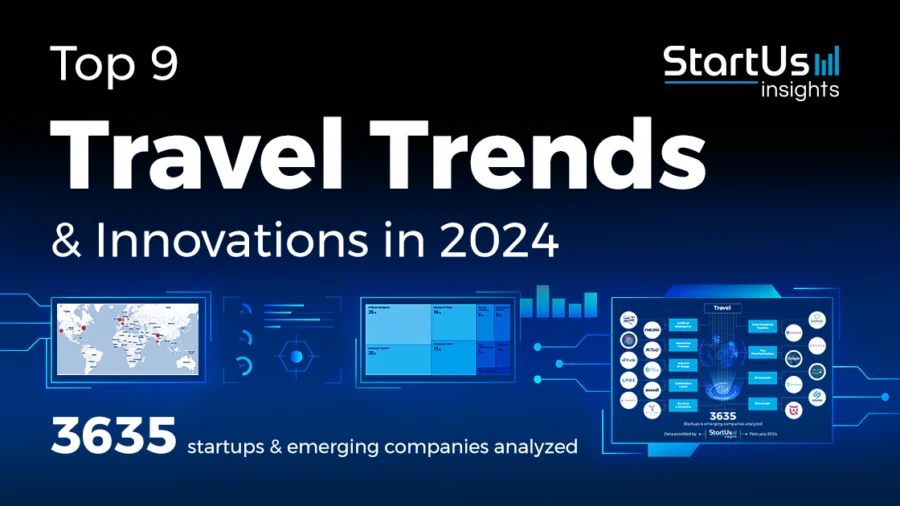

Share this:
- Click to share on Facebook (Opens in new window)
- Click to share on Twitter (Opens in new window)
- Click to share on LinkedIn (Opens in new window)
Top 9 Travel Trends & Innovations in 2024
How are the latest trends in the travel industry reshaping trip planning and enhancing tourist experiences in 2024? Explore our in-depth industry research on the top 9 travel trends based on our analysis of 3500+ companies worldwide. These trends include AI, immersive tourism, IoT, contactless travel & more!
Technological advancements in the travel industry meet the growing demand for personalized experiences, safety, and sustainability. Post the COVID-19 pandemic, emerging travel trends mark a shift towards contactless travel through digital payments, self-check-ins, and more. Additionally, artificial intelligence (AI), the Internet of Things (IoT), and blockchain are automating various hospitality and travel-related operations.
For instance, smart hotels make use of internet-connected devices to remotely control rooms. Further, businesses offer virtual tours by adopting extended reality (XR) technologies like virtual reality (VR) and augmented reality (AR). Travel companies also leverage data analytics to personalize marketing. At the same time, traveler assisting solutions like chatbots and voice technology aid them in booking accommodation and optimizing journeys. These travel trends improve the overall profitability of the tourism industry and enable it to make operations more sustainable and safe.
This article was published in July 2022 and updated in February 2024.
Innovation Map outlines the Top 9 Travel Trends & 18 Promising Startups
For this in-depth research on the Top 9 Trends & Startups, we analyzed a sample of 18 global startups and scaleups. The result of this research is data-driven innovation intelligence that improves strategic decision-making by giving you an overview of emerging technologies & startups in the travel industry. These insights are derived by working with our Big Data & Artificial Intelligence-powered StartUs Insights Discovery Platform , covering 2 500 000+ startups & scaleups globally. As the world’s largest resource for data on emerging companies, the SaaS platform enables you to identify relevant startups, emerging technologies & future industry trends quickly & exhaustively.
In the Innovation Map below, you get an overview of the Top 9 Travel Trends & Innovations that impact travel & tourism companies worldwide. Moreover, the Travel Innovation Map reveals 3 500+ hand-picked startups, all working on emerging technologies that advance their field.
Top 9 Travel Trends
- Artificial Intelligence
- Immersive Tourism
- Internet of Things
- Contactless Travel
- Big Data & Analytics
- Post-Pandemic Tourism
- Tour Premiumization
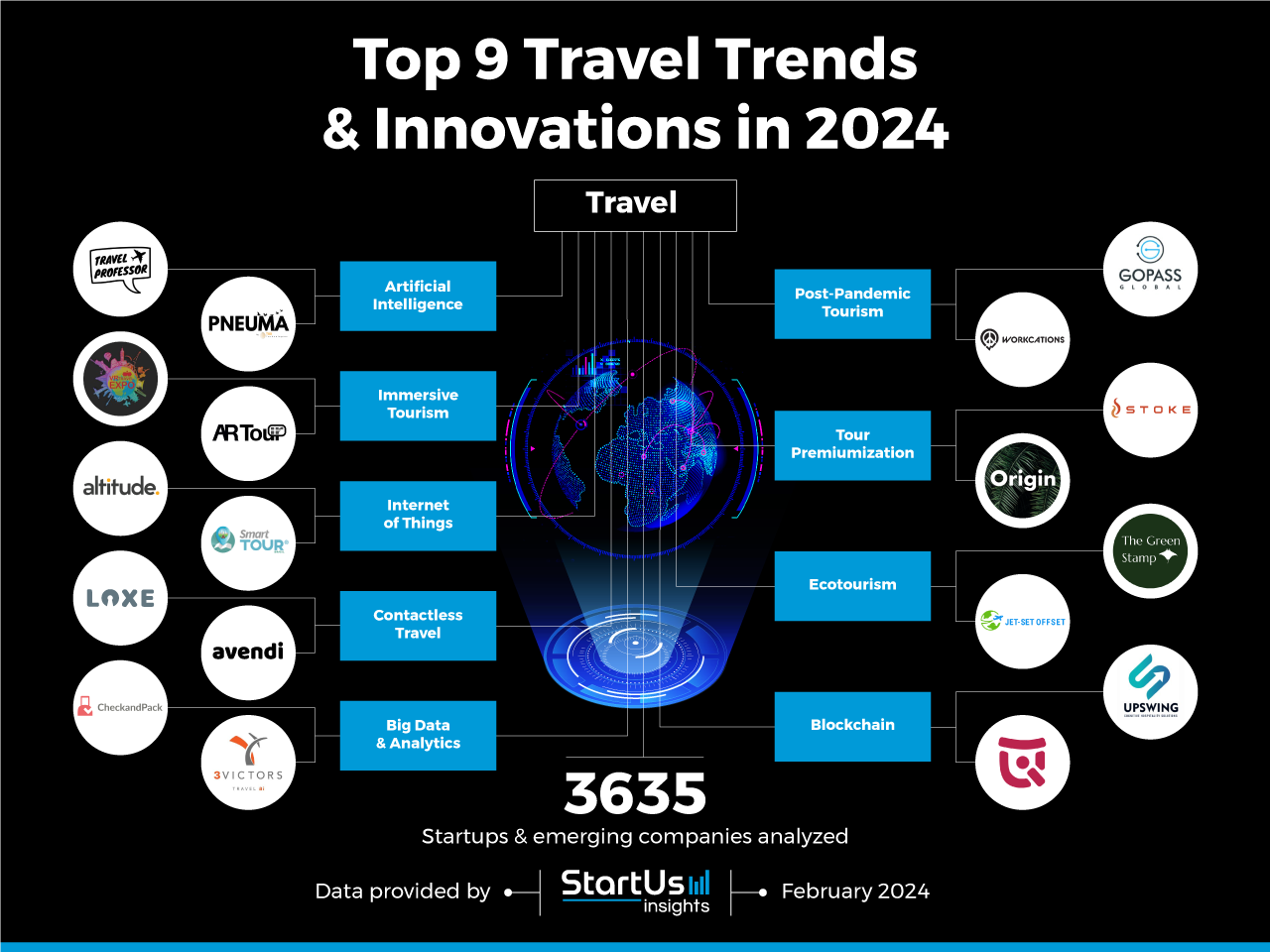
Click to download
Tree Map reveals the Impact of the Top 9 Travel Trends
Based on the Travel Innovation Map, the Tree Map below illustrates the impact of the Top 9 Travel Industry Trends in 2024. Startups and scaleups are enabling contactless travel using technologies like biometrics, radio-frequency identification (RFID), and near-field communication (NFC). This is due to increasing health and hygiene concerns post the pandemic. The use of AI in tourism ensures hassle-free trip planning while AR and VR allow tourists to virtually visit various locations and excursions. IoT increases visibility into tourism industry operations and allows passengers to track their luggage more efficiently. Further, the demand for personalized and luxurious travel is rising. Several startups enable recreational space travel as well as offer sustainable travel options to passengers.
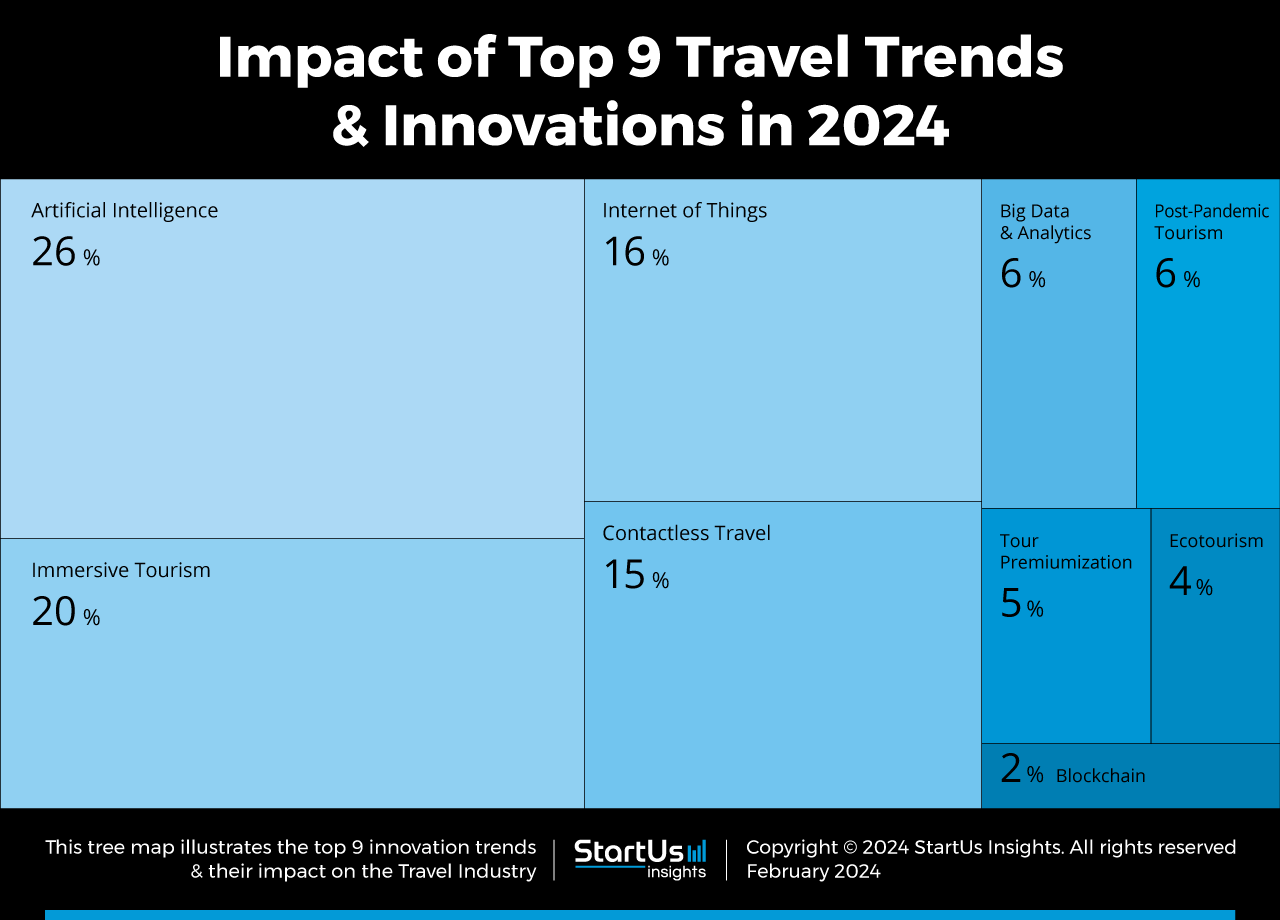
Global Startup Heat Map covers 3 635 Travel Startups & Scaleups
The Global Startup Heat Map below highlights the global distribution of the 3 635 exemplary startups & scaleups that we analyzed for this research. Created through the StartUs Insights Discovery Platform, the Heat Map reveals that the US, Europe, and India see the most activity.
Below, you get to meet 18 out of these 3 635 promising startups & scaleups as well as the solutions they develop. These 18 startups are hand-picked based on criteria such as founding year, location, funding raised, and more. Depending on your specific needs, your top picks might look entirely different.
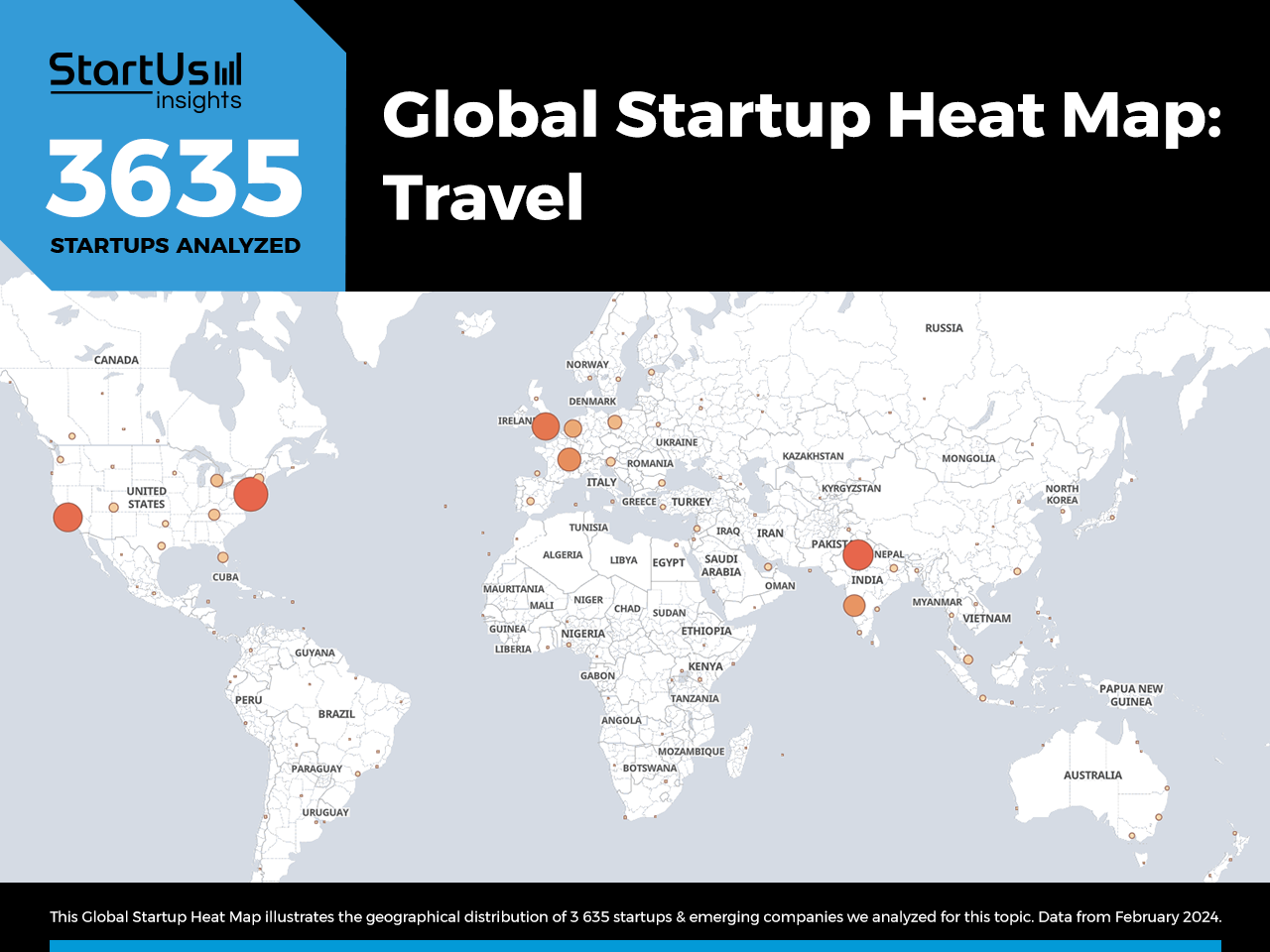
Interested in exploring all 3500+ travel startups & scaleups?
Top 9 Travel Trends in 2024
1. artificial intelligence.
Hotels employ intelligent chatbots, powered by AI, to provide quick and personalized responses to traveler inquiries. These chatbots simplify the booking process and gather customer reviews, aiding potential travelers in making informed decisions. Moreover, AI-based robots enhance the customer experience by automating hotel disinfection and delivering room service.
At airports, these robots guide travelers and assist with luggage handling. Facial recognition technology, driven by AI, expedites identity verification at airports, enhancing security and offering a swift alternative to traditional methods. Startups are developing AI-powered trip planning solutions, optimizing journeys, and personalizing travel experiences.
Travel Professor develops a Travel Chatbot
UK-based startup Travel Professor offers an AI-enabled chatbot for travelers. The startup’s chat widget software monitors multiple flight deals and notifies users when their preferences match. It also provides travel destination recommendations and flight price alerts. This allows travelers to book economical flights and have a budget-friendly tourism experience.
Pneuma Travel facilitates Travel Planning
US startup Pneuma Travel develops a voice-assisted digital agent, Sarah , to streamline the process of travel planning. This assistant, powered by AI, excels in arranging flight and accommodation bookings and assists travelers in discovering a variety of activities. Sarah , available round the clock, provides continuous support for all travel-related inquiries.
Moreover, Sarah customizes travel options according to individual preferences and budgetary constraints. The agent further enhances the travel experience by providing insights into local attractions in unfamiliar cities. Importantly, Sarah enables real-time modifications to travel plans, in compliance with specific airline policies, thereby minimizing waiting times for users.
2. Immersive Tourism
Immersive tourism caters to the growing demand for meaningful experiences among travelers, leveraging AR, VR, and mixed reality (MR). VR simulates original locations through a computer-generated environment, allowing tourists to virtually explore destinations. It provides travelers with a comprehensive 360-degree tour of points of interest.
AR enhances the travel experience with interactive elements such as navigation maps and ads. Travel companies employ AR and VR-based gamification to heighten tourist attractions. Moreover, these technologies enable hotels and resorts to present amenities and rooms in an engaging, interactive manner.
VR Travel Expo offers VR-based Travel Plans
US startup VR Travel Expo develops a VR travel application to transform the way people research and book travel. The application enables users to plan their vacations more efficiently. It provides an engaging platform for users to explore and expand their knowledge of the world. Moreover, it employs 3D geospatial technology that creates real-time digital twins of the world. This further enhances the travel planning experience.
AR Tour makes AR Glasses
Italian startup AR Tour offers AR-powered tours. The startup’s AR glasses superimpose reconstructed images of archaeological ruins to show how the site originally was. Its tour informs the tourists about the site’s history and significance via an audio-visual package. Moreover, the startup designs lightweight AR glasses to prevent motion sickness among tourists, improving convenience.
3. Internet of Things
IoT generates ample data that tourism companies leverage to personalize services in their subsequent visits. Hotels use IoT sensors to enable smart rooms that automate room lighting, temperature, and ambiance control, enhancing guest comfort. These sensors adjust appliances in vacant rooms, conserving energy and reducing the building’s carbon footprint.
Startups harness IoT to deliver location-specific information to customers, including real-time luggage tracking via IoT tags, minimizing lost items. Airlines also incorporate IoT-based solutions into seats, monitoring passenger temperature and heart rate for proactive health management.
Altitude enables Smart Hotels
New Zealand-based startup Altitude creates an IoT-based hotel software and hardware to develop smart hotels. The startup makes self-service kiosks to automate reservations, room up-gradation, payments, as well as check-in and check-out. Its hotel management platform further enables contactless engagement with guests. Additionally, Altitude’s mobile keys allow guests to open doors using mobile phones, providing convenience and saving time for travelers.
Smart Tour provides Smart Itineraries
Brazilian startup Smart Tour offers smart itineraries using IoT and quick response (QR) codes. The startup recommends travel routes and destinations based on the user’s preference in real-time. This facilitates a seamless experience for travelers. Besides, the user-generated data enables tourism managers to better understand consumer behavior and indulge in proximity marketing. The startup also offers a contact tracing solution to monitor COVID-19 infected travelers and ensure public safety.
4. Contactless Travel
Travelers benefit from contactless recognition technologies like retina scanning, which replace traditional travel documents, speeding up passenger identification and reducing airport queues. QR codes offered by travel companies allow tourists to access relevant information on their mobile devices, enhancing engagement.
Hotels have introduced contactless self-check-ins, enabling visitors to arrange services before arrival. Additionally, contactless payment modes are available in hotels and restaurants for swift and secure transactions. Moreover, wearable devices are transforming the travel experience by providing real-time notifications and touch-free access to services and information.
Loxe designs Smart Hotel Keys
US-based startup Loxe makes smart mobile keys for hotels. The startup’s smartphone app replaces key cards with contactless mobile keys that allow users to unlock doors using smartphones. It also reduces operational costs incurred in the manufacturing of conventional keys or plastic cards. Moreover, the startup designs a Bluetooth retrofit module that converts normal door locks into mobile-ready door locks. This allows hotel owners to easily convert their existing locks into smart ones without additional expenses while improving guest safety and convenience.
Avendi provides Contactless Payment
Singaporean startup Avendi offers contactless and cashless payments for travelers. The startup allows tourists to accumulate expenses throughout their trip and pay at the end of the journey. Avendi’s app utilizes QR codes to add all the billed expenses and shown through its dashboard. The user settles the tab amount in the preferred currency, preventing the inconvenience of cash withdrawal or credit card payments.
5. Big Data & Analytics
Big data empowers travel companies with customer trends for strategic marketing. Analyzing traveler behavior, they offer tailored recommendations for hotel bookings, cab hires, flight reservations, and ticket purchases.
Predicting future demand is another advantage of big data and analytics, helping hotels and airlines identify peak periods to optimize revenue. Advanced analysis of transactional data aids in detecting cyber fraud, and safeguarding sensitive customer information such as credit card details and biometric data.
CheckandPack creates a Travel Platform
Dutch startup CheckandPack offers a big data travel platform. It runs marketing campaigns to gather traveler data and understand tourism trends. Based on these insights, the platform enables businesses to approach travelers with a customized appeal. It also provides travelers with holiday planning.
3Victors provides Travel Data Analytics
US-based startup 3Victors offers travel data analytics. The startup’s product, PriceEye Suite , proactively monitors the prices of numerous airlines to provide insights into competitor prices. It creates a dashboard to display travelers’ location of interest, allowing travel airlines to better manage their revenue and pricing strategy.

6. Post-Pandemic Tourism
Post-pandemic tourism focuses on safe, sustainable, and flexible travel options, responding to evolving traveler preferences and health guidelines. Enhanced health and safety protocols, including regular sanitization and contactless services, become standard in airlines and hotels, ensuring traveler confidence.
Destinations and operators emphasize outdoor and less crowded experiences, catering to a heightened demand for nature-based and wellness travel. Flexible booking policies and trip insurance gain prominence, offering peace of mind amid uncertainties. Sustainable travel gains traction, with tourists and businesses prioritizing environmental impact and community well-being.
GOPASS Global enables Pre-travel Risk Management
Singaporean startup GOPASS Global provides a travel risk analytics platform against COVID-19. It analyzes the biosecurity risk elements involved in a trip, such as border restrictions, quarantine requirements, airport type, and airline transit points or seating in real-time. This allows travelers to assess risk factors and plan their trips accordingly.
Moreover, the startup creates world maps displaying information regarding COVID-prone areas, testing areas, and vaccine coverage. This provides travelers with a preview of the current situation, allowing them to ensure safety during business and leisure travel.
Workcations enables Work from Anywhere
Indian startup Workcations provides properties at tourist destinations for remote-working individuals. It offers amenities like internet connectivity, food, and a quiet ambiance, allowing tourists to work in a peaceful environment without hindrance. This increases employee productivity, motivation, and retention.
7. Tour Premiumization
Hyper-personalization in travel experiences is on the rise, with tourists eager to immerse themselves in diverse cultures. Luxury travelers enjoy tailored experiences and intuitive services through tour premiumization. Health and wellness packages offered by travel startups help tourists unwind.
These retreats enhance health and offer detoxifying food options. Space tourism is another exciting development, offering leisure or research trips to space. Lastly, travel startups are fostering customer loyalty and building strong relationships through membership or subscription models.
STOKE provides Space Tour
US-based startup STOKE facilitates space travel using everyday-operable rockets. The startup’s rockets are reusable and deliver satellites to any desired orbit. This enables on-demand access to space, paving way for space tours for exploration, recreation, and research. The startup also emphasizes the economical and rapid development of its hardware for feasible spacecraft launches, advancing space tourism.
Origin offers Travel Personalization
Dutch startup Origin provides premium travel personalization to tourists. The startup utilizes machine learning and travel curators to plan creative vacations. It also arranges flights and accommodation for travelers. Further, the startup measures the carbon output of itineraries and offers sustainable tourism options.
8. Ecotourism
Traveling responsibly minimizes tourism’s environmental impact and supports local communities’ well-being. Ecotourists strive to reduce their carbon footprint during their journeys. Startups contribute by developing sustainable transport, ecolodges, and solar-powered resorts.
Airline passengers have the option to offset carbon emissions during flight bookings. Local tourism stimulates small businesses economically and creates job opportunities. It also emphasizes minimum littering, which lowers pollution and the time spent on cleanups.
Jet-Set Offset simplifies Flight Carbon Offset
US-based startup Jet-Set Offset creates a carbon-offsetting platform for air travel. The startup partners with non-profit organizations working against climate change and connects them with travelers. Each time travelers book flight tickets via the startup’s platform, Jet-Set Offset contributes a certain amount per mile for their journey to environmental organizations. This way, the passenger’s journey promotes mileage-based donations to offset carbon emissions.
The Green Stamp facilitates Ethical Wildlife Tour
Dutch startup The Green Stamp provides a platform to book ethical wildlife tours. It curates tours based on the tourists’ inclinations toward certain locations or wildlife. Exploration of these projects allows travelers to indirectly contribute to their cause as these wildlife projects donate to the welfare of local communities and the environment.
9. Blockchain
Blockchain provides the travel industry with operational transparency and security. Traceable payments, particularly for international travel, are a key application, that fosters trust among parties involved in transactions.
Automation and enforcement of agreements in travel insurance and supplier contracts are achieved through smart contracts. This strengthens reliability and cuts administrative costs. Travel firms establish customer loyalty programs where points are exchanged for cryptocurrency. Lastly, blockchain increases data storage security, reducing the risk of information leaks.
Upswing facilitates Guest Profiling
Indian startup Upswing creates AURA , a blockchain-powered platform for guest profiling. It provides a holistic view of guests, their preferences, and purchase patterns. The platform associates a score with each guest and suggests improvements in their service. This facilitates hotels to provide a personalized experience to their guests and, in turn, increase sales.
UIQ Travel develops a Solo Traveling App
US-based startup UIQ Travel develops a blockchain-based app to connect solo travelers. It discovers people with shared interests and suggests tours or attractions. Such hyper-personalized recommendations assist in experience discovery and also increase traveler engagement.
Discover all Travel Trends, Technologies & Startups
Tourism, although severely impacted by the pandemic, now continues to rapidly grow across the globe. Post-pandemic trends indicate an increasing emphasis on hygiene and safety during travel. The industry is witnessing the widespread adoption of disruptive technologies like AI, XR, IoT, and blockchain. The travel industry utilizes big data to understand traveler trends for targeted marketing. The transition to ecotourism is accelerating as businesses integrate zero-emission transit and carbon offset programs to reduce their carbon footprint.
The Travel Trends & Startups outlined in this report only scratch the surface of trends that we identified during our data-driven innovation and startup scouting process. Among others, personalization, decarbonization, and travel safety will transform the sector as we know it today. Identifying new opportunities and emerging technologies to implement into your business goes a long way in gaining a competitive advantage. Get in touch to easily and exhaustively scout startups, technologies & trends that matter to you!
Your Name Business Email Company
Get our free newsletter on technology and startups.
Protected by reCAPTCHA and the Google Privacy Policy and Terms of Service apply.
Discover our Free Travel Report
Book a call today!

Mobility 22 pages report
Railway 22 pages report, cleantech 19 pages report.
Leverage our unparalleled data advantage to quickly and easily find hidden gems among 4.7M+ startups, scaleups. Access the world's most comprehensive innovation intelligence and stay ahead with AI-powered precision.
Get in touch
Your Name Business Email Company How can we support you? (optional)
Business Email

Protected by reCAPTCHA and the Google Privacy Policy and Terms of Service apply.

11 Travel Technology Trends Emerging in the Tourism Industry in 2024
With widely available vaccines and lower numbers of Covid-19 cases, travel is slowly returning to its pre-pandemic levels , although travel risks and disruptions are still present. Extreme weather conditions, political instabilities, and hardware malfunctions. With the emergence of artificial intelligence and mobile devices, customers expect a much greater level of personalization than ever before. These are the main reasons why the travel industry is consistently striving to find new and innovative ways of integrating breakthrough technologies into its operations.
Boost your travel business with the right technology
You will learn:, state of travel industry in 2024, key travel trends and technologies, customer experience with ai and ar, automation and efficiency in travel business, strategic technology investments, what is travel technology, impact of technology on the travel industry, why is technology important in the tourism and travel industry, key statistics and forecasts for travel technology in 2024, what are the latest technology trends used in the travel industry, 1. advanced travel search engines, 2. ai dynamic pricing engines, 3. dynamic scheduling systems.
- 4. Internet of Things
- 5. Augmented Reality and Virtual Reality
6. Contactless payments
- 7. AI chatbots
8. Big Data
9. 5g and fast wi-fi networks, 10. recognition technology, 11. cybersecurity practices, future of travel technology, building a travel application or extending your development team.
🚀 We're here to assist you in accelerating and scaling your business. Send us your inquiry, and we'll schedule a free estimation call .
Travel technology is an umbrella term to describe the multitude of different uses of modern technology such as artificial intelligence, augmented reality and mobile technology within the fields of tourism, travel, and hospitality industry.
Technology solutions can be deployed at virtually every point of travel in one form or another, significantly influencing the overall customer experience.
Do you remember buying an airline ticket from a real human being?
Neither do we.
We all got used to the presence of modern technological advancements in the travel industry.
There are many more ways in which modern digital technology influences and improves the travel industry.
The ultimate motivation behind implementing these technologies is pretty straightforward. It as always boils down to increasing profits and expanding business, which in turn has a positive impact on customer experience.

First and foremost, it leads to improved efficiency and decreased operating costs.
In fact, it is a win-win situation for online travel agencies, airlines, as well as the travelers.
For companies, digital transformation in travel industry means better margins and healthier cash flows. For customers, in turn, it means many more attractive tourist destinations and lower prices.
[Read also: What’s the Future of Digital Transformation and Its Trends? An Expert’s Point of View ]
These days, almost everyone has a smartphone or other mobile device, granting access to an immense choice of online services.
It is thus crucial for travel companies to allow their customers to book their trips, check-in for their flights, and find information about their destinations online.
Even though we are taking all of these modern utilities for granted, they are still a key factor for improving user experience in the travel industry. As a result, they have to be improved and optimized consistently.
Latest travel technology trends refer to the innovations and digital solutions that are transforming the travel and tourism industry. Some of the trends include online travel booking, virtual tourism, mobile travel apps, chatbots and artificial intelligence. Here are some of the latest quantitative statistics and forecasts on travel technology trends:
- Generative AI tools like ChatGPT will become more popular for trip planning, as half of travelers surveyed are interested in using them to find the perfect stay.
- Destination “dupes” and “set-jetting” will continue to be in vogue as travelers seek affordable alternatives to crowded or expensive places, or follow the locations featured in their favorite shows or movies¹.
- Global travel app revenues will grow by 17 percent in 2024, reaching nearly $400 million.
- The share of digital ad spending in the travel and leisure industry will reach 14.5 percent in the United States and 13.9 percent in the United Kingdom in 2024.
- The world’s leading online travel agencies (OTAs) will spend $2.3 billion on Google advertising in 2024.
- The global travel and tourism market will shift from 66 percent offline sales channels to 54 percent online sales channels from 2017 to 2027.
- The global travel technology market will grow by approximately 45 percent from 2020 to 2026, reaching $12.5 billion.
- The Asia-Pacific region’s recovery will be evident as travelers flock to destinations such as Taiwan, Thailand, and Australia, which have successfully contained the pandemic and reopened their borders.
- Travelers will need to be more creative and flexible in their destination choices, as travel restrictions and regulations may change frequently due to the ongoing health crisis.
- Travelers will opt for carry-on only luggage with a twist: they will use smart luggage that can track their location, charge their devices, and weigh themselves.
- Travelers will rely more on their travel advisors, who can offer more than just flights and hotels, but also personalized experiences, insider tips, and access to exclusive benefits.
Sources: Statista , Travel + Leisure , Smart Flyer .
There are plenty of different technology trends that are shaping the future of the travel industry.
Below, we’ve listed 11 of the most important travel industry trends.

Let’s compare here travel search engines to the Google search engine.
On the surface it is a pretty simple concept. A user introduce certain keywords of their interest and the search engine matches the most relevant results.
But what if you are looking for a hotel room in a specific location with certain room facilities? A simple Google search won’t be able to compute so many details.
This is where metasearch engines enter.
Metasearch engines are the tools that send search queries to many sources and organize results in a comprehensive list.
The main objective of such sites is to aggregate results in a unified way, so that the client can access the maximum number of available options on the market. It allows users to have a reliable source of objective information and to compare offers with one another.
Results presented by metasearch engines are obtained with less amount of exertion on the end user side.
Instead of searching one single search engine to find a specific website or browsing through different services, the right amount of data can be obtained by a metasearch engine.
It definitely improves the user experience. Ans save their precious time.
In the tourism industry, metasearch engines are used to search through and compare travel agencies’ offers to provide clients with as many suitable options as possible.
Nowadays, these services have grown quite robust. Many provide smart price alerts or tempting last-minute deals.
When developing a metasearch engine for an online travel agency , lodging reservation service, hotel booking engine , or a hotel inventory management software key factors are performance and scalability .
A team of Stratoflow Java developers when tasked with improving the travel search engine for a major hotel bookings aggregator decided to extract the availability search into a separate cache layer based on an in-memory data grid (IMDG) platform. It allowed for a major decrease in SQL database usage, as well as improved efficiency.
Interestingly, our client saw almost an immediate commercial effect right after the initial implementation.
Higher overall throughput of the travel search engine allowed the existing customer base to query the platform more frequently, generating higher revenues in the process.
[Read also: Introduction to a hotel channel manager ]
Airlines such as Ryanair or Southwest are known for their extremely low price model.
You can hop anytime you want on a plane from Warsaw to London for less than 30 dollars.
You may have been wondering – how are airlenes able to break even, and run a successful business model with such low prices?
The answer is artificial intelligence.
These days, the pricing of airline tickets is completely automated and run by advanced systems that aim to fill a plane with passengers at the most optimal prices.
These systems take into consideration different types of clients. Those can be either business travelers who value convenience and comfort the most or leisure travelers who are more cost-conscious regardless of long layovers.
All of these factors are summed up by the pricing system. The goal is to fill as many seats on each plane as possible. But at the same time to avoid situations of complete tickets’ unavailability for potential clients in a very complex balancing act.
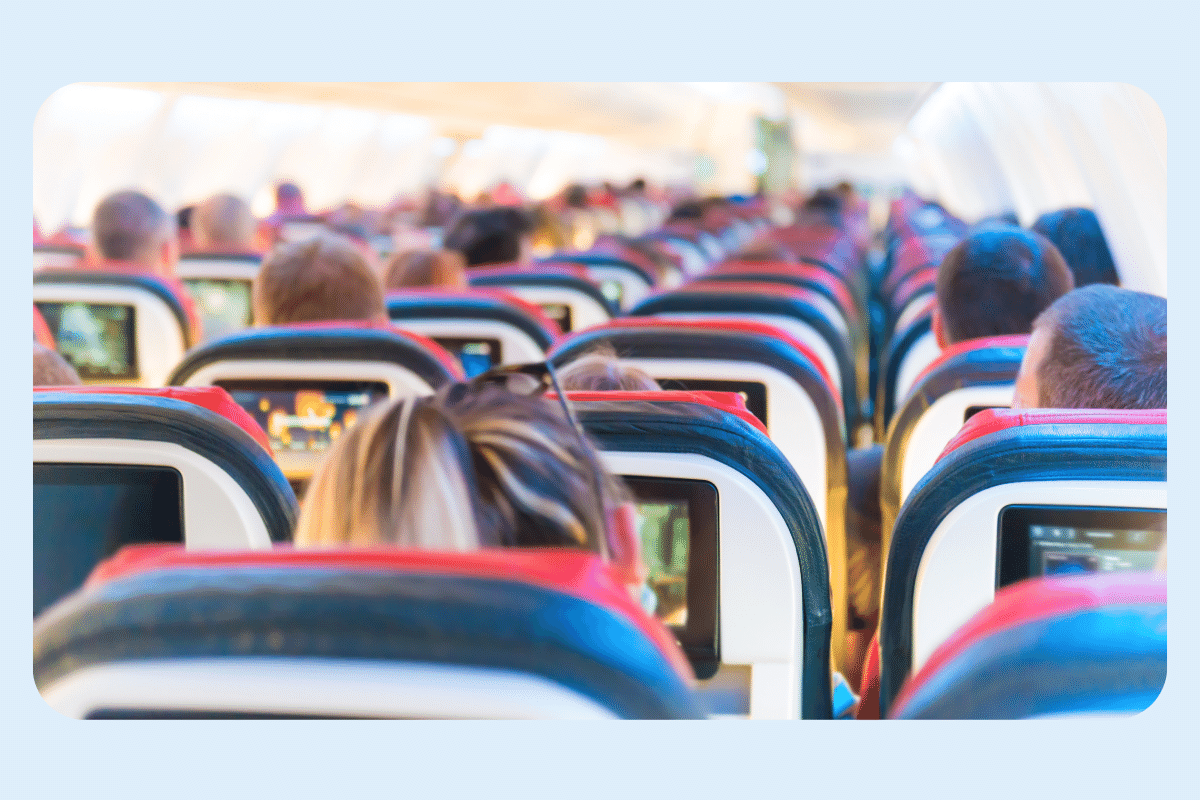
Airlines’ pricing systems have to process an immense amount of customer data as well as travel trends about local destinations.
It is worth mentioning that during the COVID-19 pandemic pricing systems of many popular airlines were pretty severely disrupted. This led to a rather peculiar situation when we could book flights from Europe to the US for less than 200 dollars.
How was that possible? The dynamic pricing engines weren’t prepared for such an exceptional situation.
Nevertheless, as pandemic restrictions loosen, and airlines worldwide resume their normal routes and operations, dynamic pricing systems continue to play a vital role in their business model .
[Read also: Benefits of Digital Transformation for Your Business ]
Airlines are characterized by their large involved capital and incredibly slim average profit margins hovering around 5% (ignoring COVID-19 disruptions).
What does it mean for travel technology trends?
It’s simple. For an airline to make money, it has to adapt fast and consistently search for profitable routing opportunities.
This task has to be handled by automatic scheduling systems .
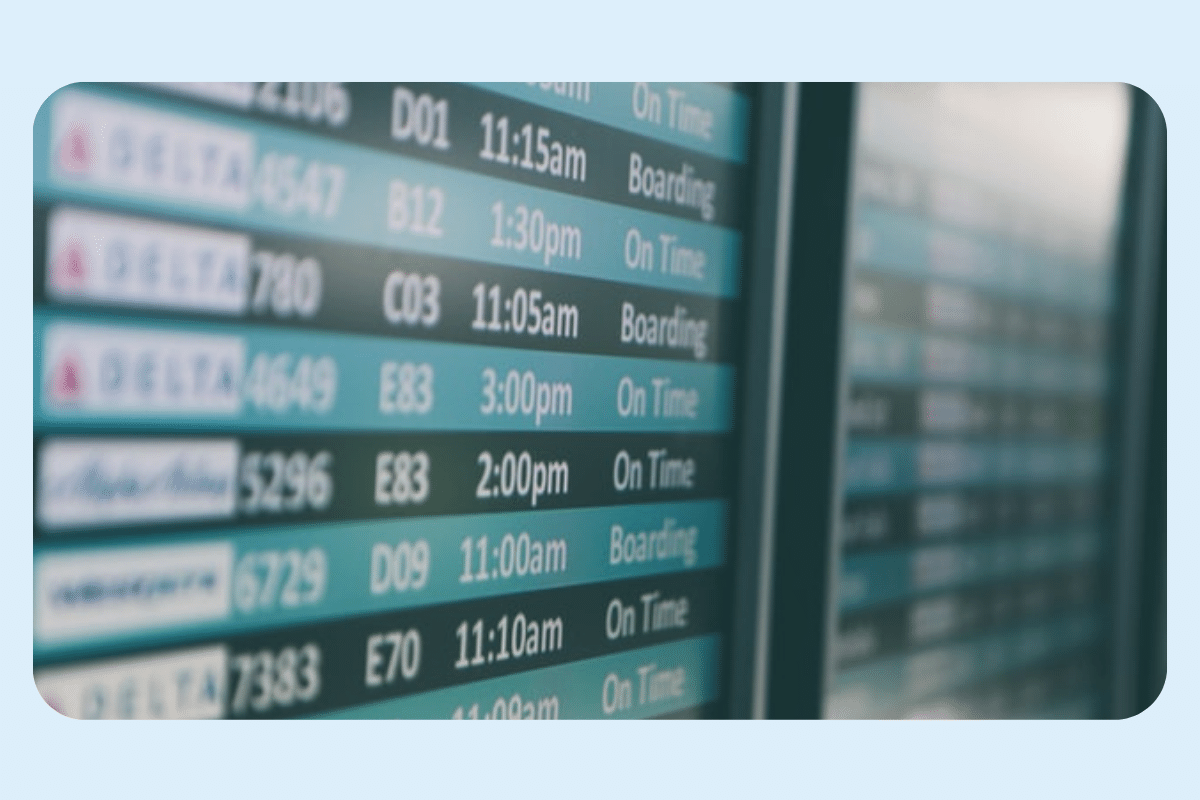
Aside from the cost, the major factor for customers determining which flight they will choose is the overall travel time.
Airlines, therefore, put an enormous effort into assembling the most optimal schedule that they can offer in the shortest travel time possible.
Modern dynamic scheduling systems have to take into account these three factors pointed by Nawal Taneja :
- Scheduling optimization system – An automated solution created by a team of experienced developers that process operational data and identify the set of possible routing and scheduling changes. These have to be both profitable and operationally feasible.Such a system works based on all the possible arrangements of feasible schedule changes. Then it sorts them by their profitability.
- Access to reliable market data – A dynamic scheduling system uses only reliable and accurate data on the routes popularity and its profitability.Considering a fairly short time horizon of flight scheduling operation, the best source for booking and revenue data is an internal Revenue Management system .
- Knowledge about potential operational constraints – Many factors dictate whether a certain route is feasible operationally or not.These include maintenance costs at airports, gate availability, and miscellaneous aircraft-specific constraints.Only understanding all of them can ensure that a dynamic scheduling system can return positive results.
In terms of profitability, it is estimated that dynamic scheduling can result in a 1-3% increase in revenue , depending on its utilization rate.
It constitutes a substantial amount when it comes to the airline industry.
Stratoflow developers have a great deal of experience in this particular field.
They were tasked by a global flight information company to improve their existing system.
Stratoflow proposed a replacement of major calculation logic with an open-source, high-performance framework that dramatically lowered TCO when compared with the existing code.
4. Internet of Things (IoT)
Another emerging technology that is slowly being adopted by the tourism industry is the Internet of Things (IoT)
This concept refers to the network of physical devices —“things”—that are equipped with various sensors in order to connect and exchange data with other systems within the network over the internet.
Depending on the use case, these “things” can range from ordinary household devices to sophisticated industrial machinery.
When it comes to its role in the tourism industry, we’ve already seen some practical implementations beginning to appear.
Some airports, using IoT devices, tag passengers’ bags to alert them of their luggage’s current whereabouts and send them a notification when it arrives at the carousel.
Hotels are also starting to leverage some IoT-enabled sensors and voice control devices to adjust things like air conditioning. Using an in-room tablet, hotel guests can seamlessly control the temperature, music, lighting, and curtains, changing the atmosphere of the room and personalizing their experience to a whole new level.
5. Augmented Reality (AR) and Virtual Reality (VR)
Virtual reality (VR) has recently once again come into the spotlight when Facebook rebranded itself and announced Metaverse. It’s a conceptual virtual universe that will be a future replacement for well-established social networks.
These visions seem exciting and a little eerie at times. But can virtual and augmented reality also influence the tourism industry in the future? As it turns out, the answer is “yes”.
Virtual Reality allows people to explore new places without leaving the comfort of their homes.
Virtual tours will enable people to have a glimpse of a certain exotic place before their visit in person. What’s more, popular travel platforms like Booking.com can set up virtual hotel room previews in order to better manage customer expectations.

Contactless payment methods take pride of place among recent tourism technology trends.
As the pandemic forced people to shy away from physical coins and banknotes, contactless payment options like GooglePay and Apple Pay have gained a lot of popularity.
When using them, the user’s device with a payment app communicates with the reader using RFID technology.
To see how it works in practice let’s take a look at the contactless payment method designed by The Walt Disney Company.
Disney offers Disney World guests custom wristbands, known as MagicBands. Visitors can link their credit card to their MagicBand to make purchases with a simple and effortless swipe of a wrist.
From a business standpoint, this solution offers Disney an unmatched opportunity to track customer behavior in order to optimize its operations even further. It is a trend that is undoubtedly gaining traction in various sectors of the travel industry.
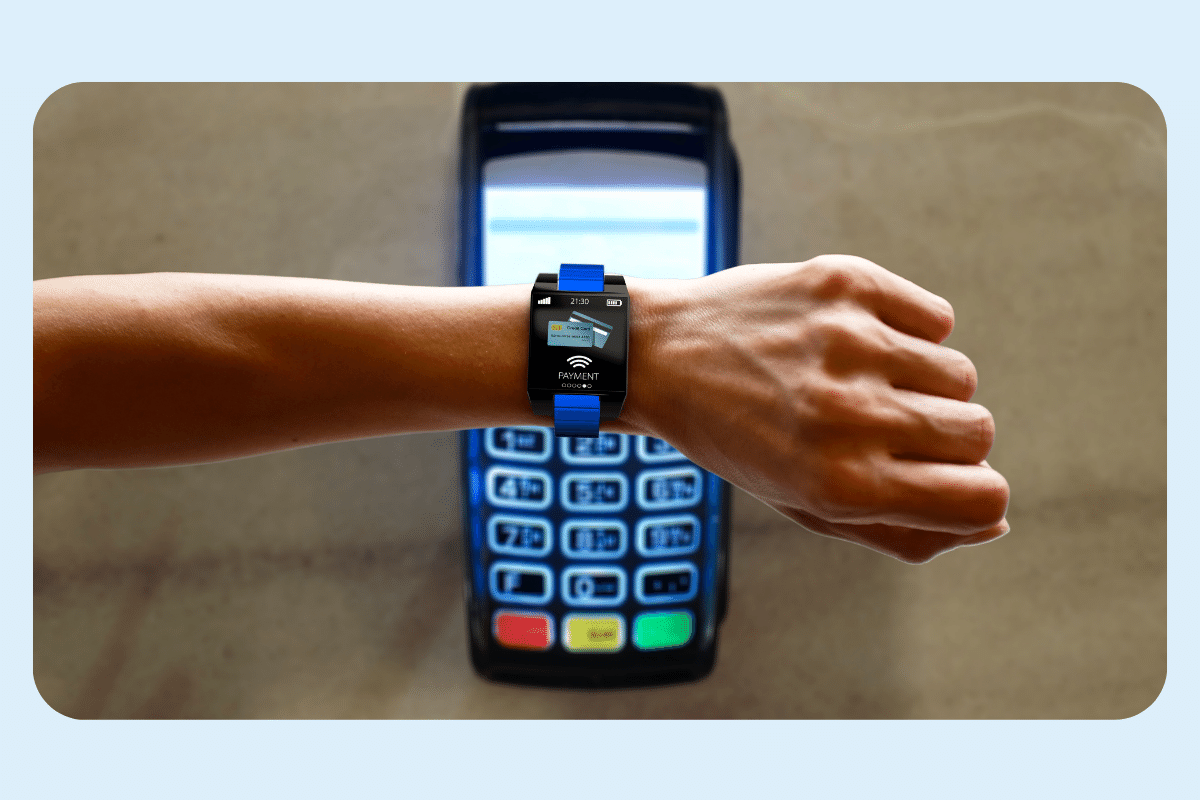
7. AI Integration and AI chatbots
AI is expected to be increasingly used in the hotel and travel industry, creating more seamless travel experiences and supporting new innovations to meet higher guest expectations.
Recently a story has surfaced that, allegedly, an advanced AI chatbot developed by Google has become self-aware.
AI chatbot technology has gone a long way in the last couple of years. It can also play a significant role in the development of the travel and tourism industry.
AI Chatbots stimulates human conversation, mostly using text interactions on various websites and services. Their main objective is to alleviate some congestion in call centers by proving at least basic help for customers 24/7.
When it comes to their usage in the travel and tourism industry, AirAsia is a good example of the use of a successful chatbot. Their advanced chatbot, AVA is able to do a multitude of things from helping travelers to choose seats and book flights to answering more difficult questions about current COVID-19 restrictions.
Data is a company’s most valuable asset.
This is also one of the main reasons why companies in the travel and hospitality industry are investing more and more funds into Big Data solutions.
Put simply, Big Data is a term that refers to large and unstructured data sets obtained from various data sources. These data sets are so voluminous that traditional data processing would have a hard time processing them into useful information.
Modern hotels and travel agents are using big data solutions to more effectively track customer behavior and preferences. This information is later used to improve the guest experience.
Big data measure precisely business performance.
Thanks to receiving data from previously untapped sources, the system allow for better yield management and demand prognosis.
[Read also: Fintech Trends That Shape Financial Future ]
As travel tech trends grow more robust with every passing year, connectivity develops at the same rapid pace.
A couple of years ago, 5G made its debut in some of the largest cities around the world, offering up to 20 times faster download speeds than before.
Even though that might not be such a big deal for an ordinary person, the connection between smart devices can now be more efficient than ever allowing more advanced IoT networks.

We have also seen an emergence of other breakthrough communication technologies, such as the Starlink internet.
Thanks to thousands of satellites in low earth orbit, people in virtually every corner of the world can enjoy internet speeds in excess of 100mbit/s and low latency unmatched by any other satellite internet provider.
A poor WiFi or Internet service in a hotel room can lead to bad online reviews for the hospitality and travel industry. With Starlink, even hotels in the most remote places can have a stable and fast internet connection.
[Read also: What is a GDS? ]
Facial recognition is the software that classifies a single face according to its gender, age, emotion, or other characteristics in an attempt to confirm a person’s identity.
It is currently one of the most powerful surveillance tools ever made.
While many people are happy to use it to effortlessly unlock their phones, companies and governments are beginning to use it to a much greater extent.
Facial recognition devices are beginning to appear in various airports across the world as an advanced security measure and potential deterrence.
According to a recent report from the Department of Homeland Security, “U.S. Customs and Border Protection (CBP) plans to dramatically expand its Biometric Exit program to cover 97 percent of outbound air passengers within four years.”
To verify accounts on virtually every major travel and tourism offer aggregator, you would have to provide a photo of your ID card and other sensitive personal data.
It’s natural to feel a bit uneasy to share so much personal information, regardless of the service’s squeaky clean reputation and impressive market share.
Tourism companies and travel businesses understand that. That’s why they dedicate a substantial amount of resources to developing reliable and safe cybersecurity practices.

As virtual reality and augmented reality technologies are becoming more and more advanced, some people speculate that they will negatively influence the tourism industry, but we beg to differ.
We predict that future tech advancements will push the travel industry towards better travel experiences and even more personalized experience.
Travel technology trends – summary
The travel and tourism industry is the one where proper interactions with the consumer are essential. As new technological breakthroughs enter the market, they are letting corporations understand their customers a bit better, and provide them with improved services and experiences.
Related Posts
- How To Build Travel Meta Search Engine: A Step-By-Step Guide
- Best Travel Management Solutions You Must Know
- Yield Management: What It Is and The Best Strategies
- Hotel Inventory Management 101: An Introduction
- How to Choose the Best Travel Agency Software to Maximize Your Revenue
We are Stratoflow, a custom travel software development company . We firmly believe that software craftsmanship, collaboration and effective communication is key in delivering complex software projects. This allows us to build advanced high-performance Java applications capable of processing vast amounts of data in a short time. We also provide our clients with an option to outsource and hire Java developers to extend their teams with experienced professionals. As a result, our Java software development services contribute to our clients’ business growth. We specialize in building bespoke travel solutions like fast search engines, metasearch engines, booking engine services or channel manager integrations.
Testimonials
The developed software product was built from scratch with solid quality. We have had a long-term engagement with Stratoflow for nearly 10 years. We look at them as partners, rather than contractors. I'm impressed by their team culture and cross-team support.
Nathan Pesin
CTO, Legerity Financials
Stratoflow was a great partner, challenging as well as supporting our customer projects for the best outcome. They have a great pool of talent within the business - all very capability technologists, as well as being business-savvy and suitable for consultancy engagements.
Chris Goodall
Managing Consultant, CG Consultancy (UK) Limited
The bespoke metal exchange platform works great, it is easily accessible and richly functional. Stratoflow managed deadlines capably, meticulously documented their progress, and delivered a complex project at an affordable cost.
Bartlomiej Knichnicki
Vice Chairman, Supervisory Board
We are very pleased with our partnership with Stratoflow and, as we continue to grow, we expect to increase the numbers of developers that work with us on our projects. They have proven to be very skilled and flexible. They're extremely reliable, and they have a very good company culture of their own, which gives them a real edge compared to other providers that serve more as production shops rather than thought partners and creative problem solvers.
Andrew Kennedy
Founder & Managing Director, Tier 2 Consulting
Stratoflow successfully customized the system according to the specific functionalities and without bugs reported. The team was commended for their adaptability in the work process and for their responsiveness.
Joshua Blavins
Tech PM, Digital Agency
The features implemented have received overwhelmingly positive feedback from end-users. Stratoflow has an incredible technical expertise and a high degree of flexibility when it comes to changing project requirements.
Chief Technology Officer, Legerity
They have impressively good knowledge of AI issues. Very responsive to any amendments and findings. Very good communication. We received a finished project which could be implemented into production shortly after testing.
CO-Founder & CTO
Circular Fashion Company
They provided superb service with seamless communication and a highly professional, technical approach. The team displays impressive technical expertise and are willing to share information and engage in constructive feedback.
Filip Stachnik
Operations Manager, Otwarte Klatki (part of Anima International)
They're very skilled technically and are also able to see the bigger picture. Stratoflow can actually think about solutions, not just the technical task at hand, which they've been assigned.
Arnd Jan Prause
Chief Operating Officer, musQueteer
Stratoflow delivered the website successfully within the timeframe and budget. They assured that the output met the set requirements. Overall, the team's performance was excellent and recommended for their exceptional technical business expertise. They've been able to deliver all of their work on time and within budget, which has been very impressive.
Lars Andersen
Founder & CEO, My Nametags
Travel sector rebound after the pandemic is complete. We have fantastic global coverage of travel data distribution due to mutual agreements and data exchange between aggregators. Competition for the best price of limited resources degradates margins. How to win? Provide personalized experience and build your own products in the front-office. The missing bits: a traveller golden record collecting past activities and a AI/ML recommendation technology.
Michał Głomba
CEO at Stratoflow

- Promising Startups 2022
- Boarding Pass
- Startup: Confidential
- Appointments
- CTalk
- Tech Gateways
- 2022 VC Survey
- Ctech Testimonials

- Terms Of Use
- Privacy Policy

Opinion The top travel-tech trends set to revolutionize tourism in 2023
Technology-driven innovations are reshaping the travel industry, with smart hotels, ar/vr experiences, contactless solutions, and ai-powered personalization leading the way towards a more seamless and efficient travel journey.

- FairFly rebrands as Oversee, adds Rapyd CEO Shtilman to board
- HyperGuest raises $23 million Series A to connect hotels, suppliers, and travel distributors
- Travel insurtech startup Faye lands $10 million in Series A

Perspective
Traveling between worlds in the metaverse
5-MINUTE READ
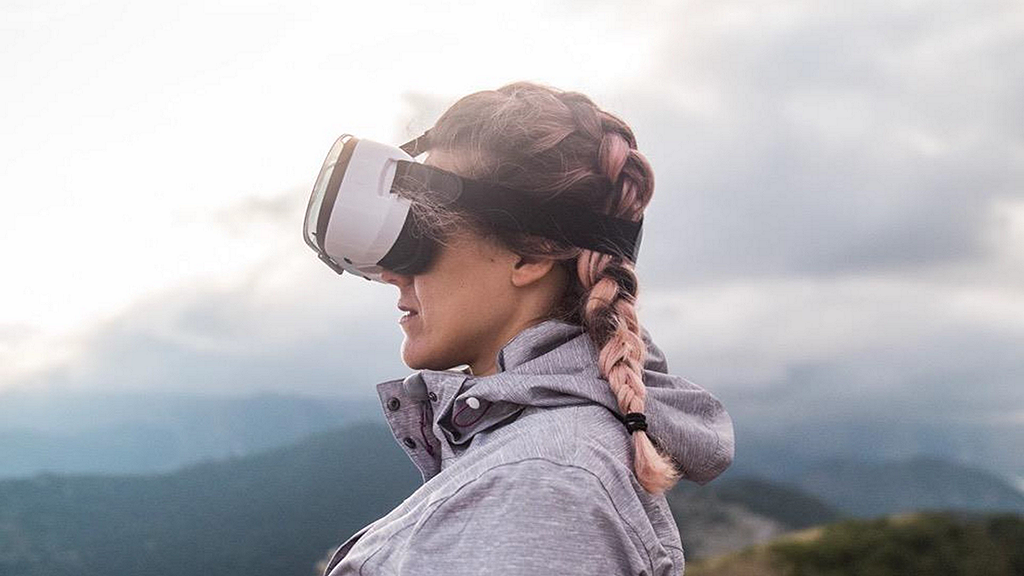
- The next wave of technology disruption driving the future is here, bringing new technologies and worlds of experiences.
- Over the next decade, ambitious travel players will shape new physical and digital realities and transform their businesses.
- Travel companies need to prepare now to understand how these emerging technologies are critical for future growth and competitiveness.
- How can travel companies successfully navigate uncertainty about the future, with blurred boundaries between humans and machines?
Welcome to the “Metaverse Continuum”
The metaverse is evolving the next generation of the internet technologies and creating boundaryless opportunities. Think of it as a continuum, spanning the spectrum of digitally enhanced worlds, realities and business models.
Expect to see it touch all facets of every business, from consumer to worker and across the enterprise; from reality to virtual and back; from 2D to 3D; and from cloud and AI to extended reality, blockchain, digital twins, edge technologies and beyond. In 2022, this way of life seems surreal, but the Metaverse Continuum is on its way and companies need to prepare now.
Next-generation traveler experience
The Metaverse Continuum enables people to immerse themselves within a universal shared experience that connects our real world to a fully virtual one—and everything in between.
The Metaverse Continuum is already transforming travel companies in five ways, changing...
- How travel companies interact with customers
- How work is done
- Which services travel companies offer
- How they make and distribute them
- How they operate their organizations
Travel Technology Vision 2022 trends
In the Travel Technology Vision 2022 report, we explore how today’s technology innovations are becoming the building blocks of our collective future. These four trends investigate the entire continuum, from the virtual to the physical, across humans and machines alike, identifying where ambitious travel companies can find rich opportunities by uprooting themselves from today and planting themselves firmly in the future.
WebMe: The internet is being reimagined as metaverse, and Web3 efforts transform the underpinning and operation of the virtual world.
The Programmable World: Control, customization and automation are being immersed into the world around us, making the physical as programmable as the digital.
The Unreal: As AI-generated data and synthetic content convincingly mimic what is “real,” authenticity is the new north star.
Computing the Impossible: A new generation of computers is solving some of the world’s most intractable problems leading to one of the biggest technological disruptions of our time.
RELATED: Why the metaverse (really) matters for travel.
Now is the time to shape the future of travel technology
We are at a crossroads. Not only because there are new technologies to master, but rather that competition in the next decade will require much more than technical skills and innovative strength. Travel companies will need a truly competitive vision. A clear vision of what the future worlds will be like and a vision of where the travel business needs to go to thrive. Technology is pointing us in the right direction. Everything else is in your hands.
The metaverse continuum is waiting for you.
RELATED: Future borders 2030: From vision to reality
Related insights
- Building a data-driven travel company
- The Guide: Travel industry magazine
- Tech Vision 2022: Meet me in the Metaverse
Sergiy Nevstruyev
Managing Director – Enterprise Architecture & Digital Transformation Lead
Anshul Gupta
Managing Director – Accenture Technology
Luis Aparicio Garcia
Associate Director – Accenture Strategy & Consulting, Travel
8 Travel Tech Trends to look at in 2023

According to the World Economic Forum’s Digital Transformation Initiative (DTI), from 2016 to 2025, digitalisation in aviation, travel and tourism is expected to create up to US$305 billion of value for the industry through increased profitability. Also, the global market for Travel Technologies estimated at US$8.6 Billion in the year 2020, is projected to reach a revised size of US$12.5 Billion by 2026.
These data show how technology and digitalization are a must for tourism and travel companies. But which ones are the main technology trends to watch for in the next years?
Voice search
In the past few years, a growing number of travel customers are using voice search to find and book plane tickets, hotel rooms or travel experiences. Voice search allows users to find what they are looking for more quickly and easily in terms of accessibility.
But also, voice search is used to improve travel experiences . For instance, in hotel rooms, voice control devices allow guests to control lighting and heating, order a meal, check the weather forecast or obtain tourism information without needing to speak to a staff hotel member.
Robots that welcome the guests in a hotel, in airports security controls to detect prohibited items, or as waiters in restaurants. There are many uses for robots in the travel and hospitality industry, helping to reduce repetitive tasks and improving safety. The uses of robots have increased in response to Covid-19, especially as they can reduce human-to-human contact in some situations.
Virtual Reality (VR) and Augmented Reality (AR)
We all agree that tourism is experience, in person, physically. However, virtual reality technology can be used, for instance, to do a virtual tour of a hotel to help potential customers to decide. Also, augmented reality enhances the travelling experience by providing details about local destinations on the tourist mobile, providing valuable information about a certain destination.
Moreover, the metaverse : it will never completely replace real travel, but it can be used to educate and promote a destination, hotel, cruise line or other travel experiences.
Artificial Intelligence and Chatbots
According to IBM, chatbots can save companies up to 30% in their customer support costs. Thanks to AI chatbots , travel companies can improve the booking experience, provide support 24/7 during the whole journey, provide an extra level of personalization, offer multi-lingual functionality… Basically, chatbots become the personal assistant for travellers.
Data is key to understanding customer needs and offering an even more personalized experience. Tourism companies can use Big Data to gain valuable information about customers, predict their possible behaviour and provide them with relevant offers. As well, Big Data contributes to better revenue management since it allows to build forecasts based on past demand, past customer behaviour, and various external factors. When demand is predictable, pricing and promotional strategies can also be optimised.
Biometric recognition
One emerging technology that is growing in airports is facial recognition technology . Using biometrics , this technology can recognize the unique shape of your face, your eyes or fingerprints, providing a high level of security in terms of authentication. Another example is how some hotels use this technology to allow access to rooms via fingerprints or to allow for semi-contactless check-outs.
Contactless
The COVID-19 pandemic caused the all-around implementation of contactless solutions to keep employees and guests safe and minimize human contact. Since then, many restaurants don’t have their menu on paper and clients have to scan a QR code to see the menu on their mobile.
In addition, contactless solutions have been used a lot in payments . Contactless payments allow travel companies to process payments much more quickly, especially since the pandemic, as many people stop carrying cash. Contactless payments work by holding a credit card or other device such as a smartphone or smartwatch or, near a card reader. The user’s device communicates with the reader using RFID technology, instead of swiping a magnetic strip or inserting a credit card into a machine.
Cybersecurity
According to a WTTC report, 72% of SMEs business in the UK, US and Europe have reported at least one cyberattack in the past; and 80% of the travel industry are SMEs, proving that cybersecurity is a very real concern for the industry. Some of the biggest threats in this area include phishing attacks and ransomware attacks. This situation requires investment in cybersecurity and solutions to keep the business and data safe.
- © TIS - Tourism Innovation Summit
- Legal Advice
- Privacy Policy
- Cookies Policy
We use technologies such as cookies to store and/or access device information. We do this to improve the browsing experience and to display (non-)personalized ads. Consent to these technologies will allow us to process data such as browsing behavior or unique IDs on this site. Failure to consent, or withdrawal of consent, may adversely affect certain features and functions.
- Credit cards
- View all credit cards
- Banking guide
- Loans guide
- Insurance guide
- Personal finance
- View all personal finance
- Small business
- Small business guide
- View all taxes
You’re our first priority. Every time.
We believe everyone should be able to make financial decisions with confidence. And while our site doesn’t feature every company or financial product available on the market, we’re proud that the guidance we offer, the information we provide and the tools we create are objective, independent, straightforward — and free.
So how do we make money? Our partners compensate us. This may influence which products we review and write about (and where those products appear on the site), but it in no way affects our recommendations or advice, which are grounded in thousands of hours of research. Our partners cannot pay us to guarantee favorable reviews of their products or services. Here is a list of our partners .

6 Ways Travel Technology Is Improving Your Trip in 2024

Many or all of the products featured here are from our partners who compensate us. This influences which products we write about and where and how the product appears on a page. However, this does not influence our evaluations. Our opinions are our own. Here is a list of our partners and here's how we make money .
Table of Contents
1. Apps for booking hotels — and picking your room
2. smart devices as digital room keys, 3. the rise of virtual queues, 4. delivery apps to replace room service, 5. robotic and app-powered food delivery in airports, 6. the growth of app-powered car rentals.
These days, travel and technology go hand-in-hand. Many of these technological advancements were spurred by early pandemic pressure for contactless payments, food service and more. For example, between February and March 2020 alone, Mastercard saw the number of contactless payments at grocery stores grow twice as fast as non-contactless transactions. Meanwhile, the number of active restaurants on the Uber Eats food delivery app grew by over 75% between Dec. 31, 2019, and Dec. 31, 2020.
Technology is seeping into travel in a way that most travelers are finding enormously beneficial. Whether shortening queues, helping travelers save money or eliminating the need to get within six feet of others, here are some of the top travel technology evolutions to know about in 2024.
Most large hotel chains have long had free apps with features like booking and live chat, but many recently got big-time improvements.
Hilton launched a feature in June 2021 that lets you book and instantly confirm connecting rooms on its app and website, which has proven especially helpful for groups.
Its app also can display a map of the hotel and allow you to select your exact room of choice, whether it’s the peaceful room farthest from the elevator or the one nearby for easy access.

The Hilton app can be used to unlock rooms at many U.S. properties so you never need to go to the front desk to retrieve a physical key card. (Photo courtesy of Hilton)
Some apps serve as a digital front desk, which then allows you to use your smartphone and smartwatch as digital keys. For example, digital keys in Hyatt’s mobile app use Bluetooth technology to let you unlock your hotel room with your phone at more than 600 hotels worldwide.
Hyatt made things even easier for Apple users in December 2021 by becoming the first hotel brand to offer room keys in Apple Wallet. At certain Hyatt hotels, you no longer need to open the Hyatt app; instead you can tap your iPhone or Apple Watch to unlock rooms.
Over at Hilton, which has offered digital keys to some degree since 2015, last year saw a huge update in Digital Key Share, which allows more than one guest to have digital access. The feature is currently available at about 80% of Hilton’s hotels worldwide.

(Photo courtesy of Disney)
In January, Clear 2021, a private biometric screening company that lets paying members bypass certain security lines at busy areas including stadiums and airports, announced that it had acquired another company designed to reduce wait times — Whyline. The acquisition could allow Clear to improve virtual queues for processes like checking vaccine status or accessing airport lounges.
» Learn more: Is Clear worth the cost?
Meanwhile, Disney rolled out a feature in its U.S. theme park apps in October 2021 called Genie, which is intended to help vacationers better plan their day. By analyzing current lines and crowds, it can suggest more efficient itineraries.
Food delivery apps have been disrupting room service lately by delivering food from around town — and eliminating the need to pay $10 for a bowl of room service cereal.
Hotels are leaning into the idea of letting other companies handle it . For example, Hyatt launched a pilot program with snack delivery service Gopuff in 2021 to deliver prepackaged and hot meals to rooms at select Hyatt Place locations. Hyatt says the program has been successful, and has since grown to more properties nationwide.
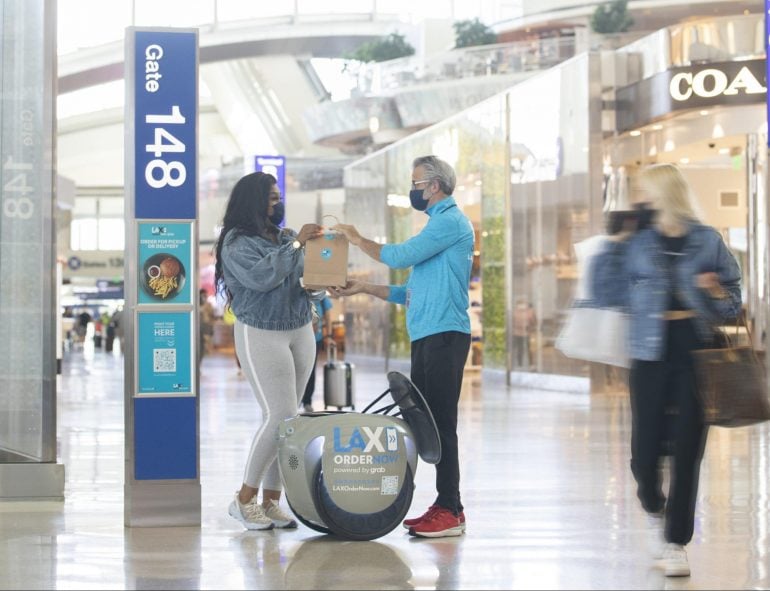
(Photo courtesy of AtYourGate)
Speaking of food delivery, the days of waiting in long airport restaurant lines might be gone. Apps like AtYourGate allow you to order, pay and pick up food from participating airport restaurants.
More recently, AtYourGate is testing services where you don’t even need to physically grab your food. Instead, robots bring it to you. A pilot program that launched in September has robots roaming around Los Angeles International Airport, bringing food directly to your gate.
The rental car industry has sometimes been brutal to travelers, but peer-to-peer car-sharing alternatives are expanding, providing consumers with more choices.
Getaround cars can be booked on an hourly basis, and there’s no need to meet up with the owner to exchange keys. Cars are booked and unlocked through an app. Getaround expanded to Hawaii at the end of 2021, marking the 10th state that Getaround added to its portfolio in 2021 and the 22nd state in its history.
» Learn more: Rental car alternatives you might not know about
How to maximize your rewards
You want a travel credit card that prioritizes what’s important to you. Here are our picks for the best travel credit cards of 2023 , including those best for:
Flexibility, point transfers and a large bonus: Chase Sapphire Preferred® Card
No annual fee: Bank of America® Travel Rewards credit card
Flat-rate travel rewards: Capital One Venture Rewards Credit Card
Bonus travel rewards and high-end perks: Chase Sapphire Reserve®
Luxury perks: The Platinum Card® from American Express
Business travelers: Ink Business Preferred® Credit Card
This article was written by NerdWallet and was originally published by The Associated Press.

on Chase's website
1x-5x 5x on travel purchased through Chase Travel℠, 3x on dining, select streaming services and online groceries, 2x on all other travel purchases, 1x on all other purchases.
75,000 Earn 75,000 bonus points after you spend $4,000 on purchases in the first 3 months from account opening. That's over $900 when you redeem through Chase Travel℠.

1.5%-5% Enjoy 5% cash back on travel purchased through Chase Travel, 3% cash back on drugstore purchases and dining at restaurants, including takeout and eligible delivery service, and unlimited 1.5% cash back on all other purchases.
Up to $300 Earn an additional 1.5% cash back on everything you buy (on up to $20,000 spent in the first year) - worth up to $300 cash back!

on Capital One's website
2x-5x Earn unlimited 2X miles on every purchase, every day. Earn 5X miles on hotels and rental cars booked through Capital One Travel, where you'll get Capital One's best prices on thousands of trip options.
75,000 Enjoy a one-time bonus of 75,000 miles once you spend $4,000 on purchases within 3 months from account opening, equal to $750 in travel.

More From Forbes
The tech trends driving a much-needed travel sector transformation.
- Share to Facebook
- Share to Twitter
- Share to Linkedin
Many startups are developing technologies that solve the problems of unnecessary human contact and ... [+] friction throughout the airport experience.
Tech innovation in the travel sector has always been uneven. While some aspects of the travel experience have been greatly enhanced by technology in recent times, these innovations have had to co-exist alongside clunky manual processes that have barely changed for 40 years.
Now, however, the pandemic has given the travel sector a severe stress test. Not only have passenger volumes fallen off a cliff since the arrival of Covid-19, but the
passenger experience has been pushed back decades due to the added bureaucracy and hassle of tests, checks, locator forms, quarantines and more.
These setbacks have brought into focus those aspects of overseas travel that are no longer fit for purpose, and a host of startups are already developing more convenient, frictionless travel experiences to entice the public back out into the wider world as the Covid situation eases. It could be just the shake-up that the sector needs.
A pathway to contactless travel
The pandemic has emphasized the sheer amount of human contact involved in international travel and led to sweeping changes in how accommodation providers operate.
According to James Jenkins-Yates, CEO of Airbnb management provider Houst (formerly Airsorted), “Keeping everyone as safe as possible has been our priority during this period, and we’ve succeeded in making sure some of the most crucial processes are handled in a Covid-secure manner. Our guests are always able to check themselves safely into properties. According to a recent Airbnb survey, this is now the preferred option for the vast majority of guests, so our goal is to ensure there’s no need to meet anyone before, during or after the stay.”
Best Travel Insurance Companies
Best covid-19 travel insurance plans.
However, the problem of unnecessary human contact remains particularly acute within airports. Checking in baggage is convoluted and time-consuming. Repeated identity checks become particularly frustrating when you find the person in front of you hasn’t filled in their paperwork. This is made worse in the age of Covid due to the many different statutory checks required by different airlines, departure and arrival destinations.
These archaic systems persist for two reasons. Firstly, travel companies are trying to do too much within the airport terminal itself. Secondly, too much passenger data is tied up within siloed systems, which is why it constantly needs manually re-checking.
However, we’re now seeing that many of these processes can be automated through pre-processing and data verification, with zero impact on the underlying security of operations.
Companies such as Zamna are developing ways to verify the identity, travel details, and even the health of passengers before they leave home. These technologies apply blockchain technology to digitally verify and connect siloed passenger data sets between airlines, governments and security agencies so that, once within the airport, all parties know who is who and who is travelling where.
Remote check-in and baggage collection services such as Airportr or DUBZ have also become more common in recent years, removing pressure from the check-in desks. However, services are still expensive and are currently used by a small minority of total travelers. The next challenge for startups is to find ways to bring down the cost of these services and make them more accessible/desirable to all passengers.
Solving the calamity of car hire
After a lengthy flight and protracted security process, the last thing weary passengers want is to waste half an hour filling in car hire forms they already completed online several weeks earlier. Yet even in our digital age, the last leg of the car hire journey remains unnecessarily painful.
To solve this problem, Paris-based startup Virtuo has streamlined and digitized the car hire process so that everything is arranged through an app, including the delivery of the car to the arrivals bay. Virtual keys are used to operate the vehicles, making for an entirely contactless, queue-free experience. Audi has launched a similar proposition, Silvercar , to provide premium vehicles to customers across more than 10 US states, again offering contactless booking via a simple app, with cars delivered to the customer’s location.
Elsewhere in the space, Getaround and Turo have been pushing peer-to-peer car rental in the US for more than a decade, and the pandemic has sparked a new wave of demand for these services.
Much-needed disruption to disruption management
One of the most challenging aspects of the pandemic has been the continuous changing, rearranging or cancelling of travel plans. Again, however, this is nothing new. A delayed flight or a cancellation has always caused significant problems for airlines, not to mention their unhappy customers.
Hence, it’s no surprise to see a variety of recent market entrants devising innovative ways to smooth out some of the issues caused by disrupted travel.
For example, Sparefare has created a marketplace for customers to buy or sell unwanted tickets, avoiding the need for passengers to subject themselves to lengthy refund/voucher request processes. Journera allows travel providers to get ahead of the game in the event of cancellations or delays, identifying affected passengers and allowing customer service agents to better accommodate their needs through any disruptions and transitions. And Pilota enables customers to compare flights based on their reliability and provides airlines with AI-powered predictions about how each flight will go.
Serial entrepreneur and investor Karen Hanton , founder of pet-friendly travel provider PetsPyjamas , explains, “We’ve all had to be so resourceful during the pandemic, that as we emerge the other side, we’re prioritizing flexibility across practically all aspects of life. Consequently, travel companies have had to abandon their pre-Covid conventions – they know that if they don’t have flexibility baked into their offering, people are far less likely to book with them.”
Travel insurance without the caveats
The prospect of overseas travel disruption always makes passengers nervous, which is why travel insurance has become such big business over the past few decades. Unfortunately, however, too many providers have failed to deliver on their protective promises, making the claims process difficult and long-winded, or inserting hidden caveats into policies to avoid paying out around many common types of disruption.
The issue reached a head during the pandemic when it was revealed that practically none of the insurers’ policies provided Covid-appropriate cover, and the startup community has duly taken note of passengers’ growing distrust with traditional providers.
UK-based Blink now offers bespoke flight disruption insurance, giving customers a range of suitable options according to the specific nature and duration of the disruption – from airport lounge access to hotel rooms to cash claims. French company Koala has lowered the burden of proof for disrupted passengers, making it easier for them to establish their claim eligibility and thus ensure that 100% of passengers entitled to compensation are compensated.
Moving to a decentralized future
The global travel sector has always relied on intermediaries, from the high street travel agencies of 20 years ago to today’s online booking platforms. Perhaps the biggest sector-wide shift that we’re likely to see in the coming years is unnecessary middlemen being cut out of the chain to bring down the cost of supply.
Again, blockchain is the technology in making this possible, and several startups are already building blockchain-based infrastructure to better connect travel providers. For example, Further can enable P2P transactions such as bookings and payments directly between airlines and their business partners. Winding Tree allows airlines and hotels to distribute their products to travel agents directly. Through its open-source infrastructure, it hopes to drive a new era of industry-wide developer collaboration.
More broadly, Jenkins-Yates argues that it is time for the sector to make a definitive break from the past. “It seems like travel is desperate to get back to the ‘old normal’, but what really needs to be addressed is that things will never be done the same way they used to be done pre-pandemic. The reason why the future of travel tech is so exciting is because we have been brought face-to-face with the true limitations of the old travel regime.”
If such bold and sweeping initiatives – like those we’re currently seeing through blockchain applications – prove successful, who knows what additional travel trends we may see emerging in years to come. One thing’s for sure though – the sector is finally seeing the sort of tech-driven innovation it needs to propel a sustainable, long-term recovery.
- Editorial Standards
- Reprints & Permissions

Travel Tech Revolution: 3 Experts Share Their Insights on How Tech Shapes Journeys
W e've gone from paper maps and written itineraries to instant technology at our fingertips in less than a decade. But is the tech revolution ruining our travel experiences?
It's true that more people are glued to their phones than ever, but is the convenience worth it? And are we safer with technology while traveling the world?
In this post, three tech experts share their insights into how technology shapes our journeys and what the future of travel might hold.
Personalized Travel Recommendations
The COVID-19 pandemic left the travel industry on its knees, and it underwent a serious transformation to regain its customer base.
Now, people want personalized travel recommendations, unique experiences, and effortless travel planning – all from the comfort of their homes.
Technology is making that possible with remote check-ins, travel guide apps, and 24-hour chatbots to engage travelers anywhere in the world.
These tools are widely used in various industries, from clothing fitting rooms to home interiors. But they are now beginning to make an appearance in the travel industry.
Museums, in particular, have opened their doors to online exhibitions, allowing you to visit them without ever leaving home. In the future, the same tech could allow you to visit the wonders of the world without being there in person, making "travel" more accessible.
But is VR a good replacement for the real thing? And will people even adopt the technology?
"In the gaming world, VR is already huge. The technology gives players immersive experiences, and about one in ten gamers already own a VR headset. Although augmented reality will never replace travel, it does make worldwide experiences far more accessible." – Michael Robery from GTA Boom
Smart Wearables
Technology is also creeping into our experiences during travel. There are already travel companies using smart wearable technology to improve customer engagement.
For example, Air Berlin has smartwatch boarding passes that display documents with a shake of the wrist and can be scanned the same as a digital boarding pass on a phone.
Of course, relying on digital boarding passes can result in difficulties, and many travelers still rely on paper backups. So, perhaps a fully digital check-in isn't quite here yet.
The Role of AI
There are different opportunities for AI to enter the travel sphere. AI-powered chatbots like ChatGBT can already give you personalized travel recommendations, activity lists, weather reports, hotel recommendations, and more based on your inquiries and past travel history.
AI can also help with language barriers. Any chatbot equipped with language translation can provide real-time communication with locals, helping travelers navigate with ease.
"The travel industry will undoubtedly be disrupted by AI. The technology significantly eases the process of travel research, and can even give real-time updates on travel delays, prices, and more to make the process of traveling much smoother." – Dr. Johns from Hackr
But what will advances in AI mean for travel agents? Will more reliance on technology remove the human element of our vacation plans?
Cybersecurity Concerns
When any industry begins to rely too heavily on technology, dangers arise when the technology fails. Technology has unquestionably made us safer while we travel, but we need to respect its limits if we want to retain the joy of traveling.
"Huge amounts of information are collected by travel agencies, meaning that increased cybersecurity measures are needed to handle the increase in reliance on technology. " – Taimur Ijlal from Netify
Although technology is making travel more convenient, it's also creating a digital divide. In remote or economically poor regions, people have less access to the internet or digital devices, creating inequalities in travel opportunities and access to the best deals.
Over-Tourism & The Environment
Many of our leaps forward in technology have been made to help the environment. With less reliance on paper boarding passes and other documents, it can feel as though technology is helping our planet, but is that the whole story?
With travel becoming more convenient than ever, we're experiencing over-tourism in the most popular destinations around the world. Places like Venice, Barcelona, and Bali are swarmed by tourists each year, leading to overcrowding, stretching of resources, and loss of culture.
There's also the issue of the envrionmental impact of flights. In the US alone, there are around 45,000 flights handled by the FAA's Air Traffic Organization (ATO) every day – that's a massive contributor to our carbon footprint.
The Verdict
As we look to the future, it's clear that technology will play an ever-growing role in the travel industry. From augmented reality and smart wearables to AI-powered planning, the impact is undeniable.
But the technology revolution doesn't come without challenges. With concerns about safety, over-tourism, and the environment, it's important to strike the right balance between technology and authentic human interaction when planning our trips.
This article originally appeared on TheRoamWild and was syndicated by MediaFeed.
More from MediaFeed:
- 8 Guns 100% Made in the USA
- Only People Who Lived Through the ’90s Will Understand These Things
Like MediaFeed’s content? Be sure to follow us.
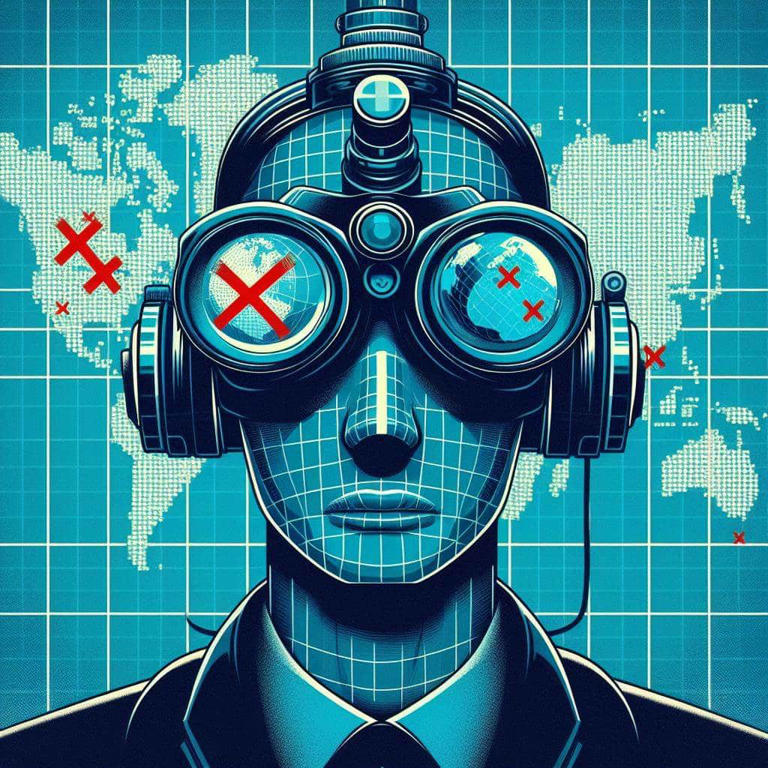
- International edition
- Australia edition
- Europe edition

How technology has transformed the travel industry
There has been a digital revolution for holidaymakers, and technological advances may see increased personalisation take off
At the turn of this century, planning a holiday might have entailed a visit to the local travel agent. Or for the more adventurous traveller armed with a well-thumbed guidebook, relying on trusted word-of-mouth recommendations to set their travel agenda. Today, thanks to breakthroughs in technology and high-speed internet, travellers can book their own flight and hotels online, choose to stay in a stranger’s house, and rather than entering that unfamiliar restaurant with trepidation, search online reviews on their mobile while connected to the hotel Wi-Fi.
“Digitalisation has given us choice in a big way,” says Tamara Lohan, co-founder and chief technology officer at boutique hotels website Mr & Mrs Smith . “More people are travelling than ever before, and companies like Airbnb encourage younger people to explore sooner, and in a more cost-effective way. Technology has also given us more information on the place we are going than ever before. Want to know if there is an artisan chocolatier close to your hotel in Amsterdam? Well, now you can – in seconds.”
In the digital age, we’ve become a generation of DIY travellers who plan, manage and book travel online. So what has this meant for businesses in the travel industry?
For travel agents, the rise of digital has severely disrupted the industry. “Traditional travel distribution in which high street travel agencies played a dominant role was revolutionised with online travel agencies and direct distribution through airlines and hotels’ websites acquiring a key role,” explains Angelo Rossini, contributing analyst at Euromonitor International .
“Low-cost carriers and online travel agencies were the clear winner of the online travel revolution over the past 15 years, changing the way today consumers plan and book their trips. Tour operators suffered the rise of independent travel and are today embracing the online and mobile channels in order to stay competitive,” says Rossini.
While the internet killed off many high street travel agents, others have been forced to adapt to a very changing marketplace, with many embracing the internet by introducing online bookings.
“As part of our omnichannel strategy, Thomas Cook has seen the need to make sure our customers can be served in a seamless way through whatever channel they wish – online through mobile, tablet, desktop or offline in a store or over the phone,” says its group head of digital operations, Graham Cook. The company has stepped up its digital innovation of late, even introducing virtual reality experiences across select stores.
One of the biggest disruptors to the travel industry has of course been Airbnb , which spurred the launch of other similar online-only companies such as One Fine Stay . Thanks to the rise of such sharing-economy companies we’re more likely to book a room in a stranger’s house, with 9% of UK and US travellers having rented space in a private home or apartment.
“The digital revolution has impacted almost everything in the world as we know it,” says James McClure, country manager for UK and Ireland at Airbnb . “In Airbnb’s case, technology has also brought tradition into the mainstream. The concept of staying in people’s homes when travelling is not a new one and dates back many centuries, but what technology has been able do is accelerate this to a fast-moving and easily-accessible global phenomenon.”
Technology has also presented new opportunities for small businesses in the travel sector, allowing consumers worldwide to stumble across say a B&B in Brighton or luxury safari park in Kenya through online review sites, social media and the businesses’ own websites.
“We pivoted from a hotel guidebook to become an online travel agent just as the internet started to become a place people could finally trust with their credit cards,” says Mr & Mrs Smith’s Lohan. “In the whole of that first month online we did 10 bookings – now we do 300 a day.” While she says the business changed its model due to internet and allows online bookings, it still runs 24/7 customer service support via phones “for people who want that human element”.
For travel brands it’s meant they have had to get smarter and adapt as consumers expectations rise. Take airlines, some of which now allow passengers to check-in online, access their boarding pass on mobile and operate Wi-Fi on flights.
“Digital technology has changed the way we connect with guests, creating a 24/7 relationship in and out of stay,” says Stephan Croix, vice-president of marketing at Starwood Hotels and Resorts, owner of hotel chains W Hotels and Aloft .
“It is also transforming every phase of hospitality – from finding a hotel, to checking in, to unlocking your door and personalising your stay. As travel is inherently mobile, travellers expect to use their mobile devices to enrich their travel experiences,” Croix says.
As a result, Starwood has adapted and invested in mobile, leading to overall mobile gross bookings rising more than 50% in 2015 compared with the year before.
Like others in the sector, the company is continually embracing technology to woo its digitally-savvy customers. It recently launched “Let’s chat”, enabling guests to communicate with its front desk associates via WhatsApp, Blackberry messenger or iPhone before or during their stay.
So how will technology shape the future of travel? “The next few years will see travellers requiring an increasingly personalised service, with companies able to suggest them customised products on the basis of their profiles and past behaviour,” says Rossini. With many travellers already seeking a more customised and “local” experience, truly personalised trips are already beginning to take off.
To get weekly news analysis, job alerts and event notifications direct to your inbox, sign up free for Media & Tech Network membership .
All Guardian Media & Tech Network content is editorially independent except for pieces labelled “Paid for by” – find out more here .
- Media & Tech Network
- Digital business
- Mobile phones
- sponsored features
Comments (…)
Most viewed.

About Travel Tech

Our Mission
The mission of the Travel Technology Association is to empower traveler choice. We bring together travel innovators to promote transparency and competition through education and advocacy.
All travelers can explore the world on their terms and values. Our efforts make the travel experience more efficient, affordable, and accessible to consumers.
Our Members
Travel Tech is the only organization advocating on behalf of travel tech companies to create a more transparent, competitive, and innovative global travel marketplace. As part of this powerful collective, our member companies are strengthened by our ability to influence critical public policy decisions that affect the future of the industry.

About the Industry
Expected to grow, $289 billion.
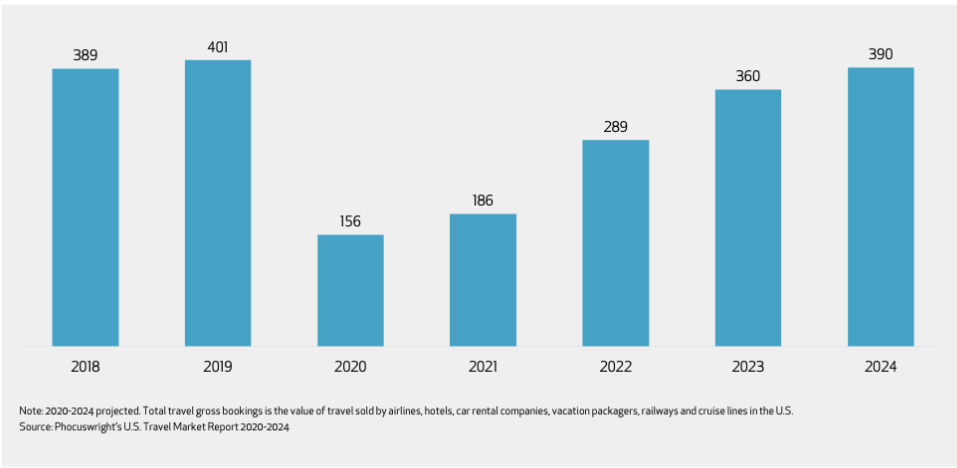
Gross revenue for the U.S. travel sector fell 61% to just $156 billion in 2020 as the COVID-19 pandemic impacted the sector. However, a rapid recovery is underway, and gross revenue is expected to grow to $289 billion in 2022 with a full recovery expected by 2025.
Online travel intermediaries, including online travel agencies (OTAs), metasearch services and travel management companies (TMCs) (supported mainly by GDS technology) represent a significant source of indirect business for most travel suppliers, and delivered over one third of overall industry gross revenue in 2020.
US Total Travel Market Share
By segment 2021.
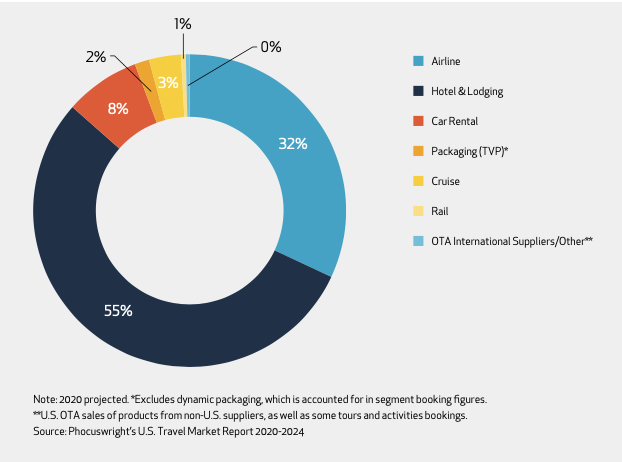
Indirect distribution, at $182 billion, accounted for just over 45% of the total travel sector in 2019, falling to 36% in 2020 as consumers turned to direct channels during the pandemic. However, indirect channel distribution is expected to return to pre-pandemic levels by 2024.
By Segment 2020
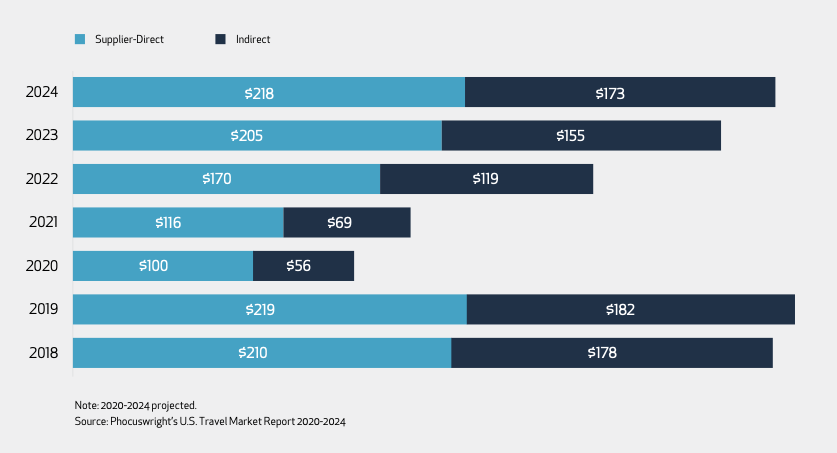
Who is Travel Tech?

Laura Chadwick
Laura Knapp Chadwick is President & CEO of the Travel Tech Association. Chadwick brings nearly fifteen years of trade association leadership in government affairs and membership to her work at Travel Tech. Previously, Chadwick served as the XR Association’s (XRA) Vice President of Industry Relations. She launched the new organization’s membership, marketing, and development efforts as “Employee # 2.” Under Chadwick’s leadership, XRA grew from five members to more than 40. She was also a director of corporate member engagement at the National Restaurant Association and its federal lobbyist focused on technology and innovation within its Government Affairs department. Before the National Restaurant Association, Chadwick worked at the Consumer Technology Association where she advocated for pro-innovation public policy.
Chadwick also spent over six years working on Capitol Hill for U.S. Congressmen Mike Thompson (CA-05) and Adam Schiff (CA-28), and on U.S. Congressman Brad Carson’s U.S. Senate race in Oklahoma.
Chadwick graduated from Washington & Lee University with a Bachelor’s in Politics and holds a Master of Public Administration degree from American University’s School of Public Affairs. She lives in Arlington, VA with her twin sons and dog.

Nicole Brewin
Brewin joins Travel Tech from the Railway Supply Institute (RSI), where she led its government affairs practice for over two decades. In that capacity, Brewin built RSI’s advocacy program into the organization’s largest team, secured historic investment levels for rail grants in the Infrastructure Investment and Jobs Act (IIJA), and created its Political Action Committee, where she tripled its annual fundraising efforts. Prior to her work at RSI, Brewin worked as a Legislative Assistant for Congressman Peter Visclosky (IN-1.)

Bethany Reitsma
Bethany Reitsma is the Industry Relations Manager at the Travel Technology Association.
In this position, Reitsma serves as webmaster, manages all marketing, communications, and government relations projects, and supports membership growth.
Prior to joining Travel Tech, Reitsma worked with the XR Association as Marketing & Membership Coordinator, where she led membership recruitment efforts, developed and executed a grassroots advocacy strategy, and co-managed all member communications.
Reitsma graduated from Washington & Lee University with a Bachelor’s in Politics and an additional Philosophy major, with a Computer Science minor.
Travel Tech Through the Years
Travel Tech was founded in 1999 and will be celebrating 25 years in 2024! Click below to read more about what Travel Tech has been up to since it’s creation.

The Interactive Travel Services Association (ITSA) is formed as a nonprofit mutual benefit corporation under the California Nonprofit Mutual Benefit Corporation Law to “promote the growth of the online travel services industry, educate the general public, and participate in the administrative, legislative, and judicial processes regarding governance of the industry”
Organization rebranded to Travel Tech: The Travel Technology Association, with the tagline: Empowering Traveler Choice, reaffirming its position as the industry voice for the online travel companies (OTCs) and global distribution companies (GDSs), and their essential role in facilitating travel.
Travel Tech welcomes short term rental innovators including Airbnb and Tripadvisor, technology companies that connect consumers with suppliers and are transforming the way millions around the globe travel.
FAA bill is passed, including a provision that maintains the U.S. Department of Transportation’s (DOT) full-fare advertising rule that ensures consumers will always see the all-in airfare when shopping for flights on airline websites.
Laura Chadwick becomes President & CEO of Travel Tech.
Nicole Brewin becomes VP of Government Affairs at Travel Tech.
Travel Tech announces its first-ever membership category expansion. The new “Advocate” member tier is aimed at startups and small and medium-sized travel technology companies. It launches with the addition of four new member companies.
Get Involved
Policy action center.
Make Your Voice Heard by Taking Action using our Grassroots Tool.

Delivered every Wednesday, Travel Tech’s Passport newsletter keeps industry leaders up-to-date on current and emerging policy issues facing the travel tech industry.
In addition to the latest about Travel Tech and its advocacy efforts, the Passport Newsletter includes a news digest of the top stories at the intersection of travel, technology, and public policy.
No thanks, I’m not interested
Explore the world of Travel Tech
Flagship Program
.png)
Travel Startups Finder

Interested in travel startups?

Running a travel startup?
Videos & talks.
Future travel experience: How will the COVID-19 crisis change the way we consume travel?

What is the future of online travel in a world where global pandemic is "normal”?

Corporate Open Innovation - THE opportunity

Hubs & Accelerators

Browse investors


A Phocuswright Special Project
Traveler technology, travelers’ embrace of technology continues to evolve.
Contact us about becoming a sponsor: [email protected]
In partnership with:

By Phocuswright Research

Sponsor Pivotal Research to Elevate Your Industry Standing
Lead the way in understanding travelers' satisfactions and concerns with technologies used in planning, booking and experiencing travel..
In past years, Phocuswright fielded Traveler Technology surveys in the US and Europe, plus a global study in 2019, focused primarily on measuring the rise of mobile device usage for shopping and booking and the influence of social media on destination and purchase decisions.
Nowadays, mobile devices are ubiquitous and the influence of social media on travel decision making is well understood. But travelers’ relationship with technology continues to evolve, with the latest tech-driven services and hardware devices delighting, frustrating and even unsettling travelers young and old.
This updated Travel Technology study will measure U.S. online travelers’ usage and perceptions of cutting-edge technology including generative AI, virtual and augmented reality, the Internet of Things, digital identity and robotics . It will aim to understand travelers’ satisfactions and concerns with the increasingly common technology used in planning, booking and experiencing travel today.
⬇️ Scroll to see Research Objectives, Key Questions to be Addressed and the benefits of sponsoring like getting the data.
Research Objectives
As new technologies develop and find mainstream applications, travel brands must understand their customers’ attitudes and perceptions about the tools. They must reflect on whether consumers are willing to use the tech and how their purchasing decisions are impacted by their attitudes towards technology.
This study will help the industry:
- Understand travelers’ awareness of, attitudes towards and motivations for using or avoiding certain technologies
- Uncover pain points and key challenges with increasingly popular technologies
- Understand which technologies are competitive differentiators
Key Questions to be Addressed
The study will specifically answer:
- Where do travelers stand in terms of overall tech savviness?
- What are the barriers to technology usage for travelers?
- What are problems travelers are encountering that could be fixed with technology?
- What do travelers wish technology could do for them that it currently doesn’t do?
- What technology-enabled products and services are table stakes vs. competitive differentiators?
- What are travelers’ attitudes toward cutting edge technologies such as generative AI, virtual and augmented reality, the Internet of things, digital identity and robotics?
- How much do travelers trust these technologies? Why or why not?
Click here for full sponsor benefits . Or contact us at [email protected]
Phocuswright will work with you to align credible intelligence with your leadership position traveler technology, while giving you access to proprietary research that assists with strategy, product and marketing positioning.
More than ever, travel businesses that don’t embrace emerging technologies are on a path toward obsolescence..
Through user surveys and proprietary research methodologies, this research will measure U.S. online travelers’ usage and perceptions of cutting-edge technology including generative AI, virtual and augmented reality, the Internet of Things, digital identity and robotics .
Email us at [email protected]

Learn more about Phocuswright Special Projects:
Sponsorship levels & deliverables » Add-on options » Project timeline »
Design Your Own Sponsorship Package
Let us create the sponsorship package that's right for your company.
Contact our team today: +1 860 350-4084 x501 Email us: [email protected]

WEEKLY RESEARCH INSIGHTS
We dig deep to give you the data and trends that drive the travel, tourism and hospitality industry.
Get the latest in travel industry highlights with our free weekly research articles and more. Sign up to get the latest delivered directly to your inbox.
FOR MORE INSIGHTS
See all of Phocuswright's free research insights here .
Sign up to get the latest delivered directly to your inbox.
Open Access Research Subscription
Research is our priority. Our Open Access research subscription puts the world’s most comprehensive library of travel research and data visualization at your fingertips.
Clients have relied on Phocuswright's deep industry knowledge for over 25 years to power great decisions, help justify a pitch, build a strategic plan and elevate any presentation through trusted research and data. When companies and executives reference Phocuswright, they gain the trust of an industry keen on data, trends and analytics.
See the full benefits of an Open Access subscription here .
For any questions you may have, please call or email us at 📱 +1 860 350-4084 📧 [email protected]

About Phocuswright Events FAQ Copyright Contact Us Research News Privacy & Terms Press Room
Email Updates Register for Phocuswright emails about research data, events and more:
A WHOLLY OWNED SUBSIDIARY OF

Copyright © 2023 by Northstar Travel Media LLC. All Rights Reserved. PO Box 760, Sherman, CT 06784 USA | Telephone: +1 201 902-2000
The Phocuswright Conference • Phocuswright Europe • Global Startup Pitch • Travel Tech Fellowship • Phocuswire • Web In Travel • Inntopia • Retail Travel • Hotel Investment
Image captions


We couldn’t find any results matching your search.
Please try using other words for your search or explore other sections of the website for relevant information.
We’re sorry, we are currently experiencing some issues, please try again later.
Our team is working diligently to resolve the issue. Thank you for your patience and understanding.
Sabre Hospitality renews Wyndham following accelerated migration
More than 5,000 Wyndham hotels now on Sabre SynXis Property Hub, nearly one year ahead of schedule
SOUTHLAKE, Texas , May 1, 2024 /PRNewswire/ -- Sabre Hospitality, a division of Sabre Corporation (NASDAQ: SABR), a leading technology provider that powers the global travel industry, today announced a multi-year renewal with Wyndham Hotels & Resorts , following the hotel franchisor's highly successful adoption of SynXis Property Hub, Sabre Hospitality's property management system (PMS). With seamless integration to SynXis Central Reservation System as a single source of truth, SynXis Property Hub increases operational efficiency by reducing the time to execute routine tasks and allows hoteliers to access their property from anywhere through cloud-native technology.
In a landmark achievement that showcases the decade-long partnership between the two companies, Sabre and Wyndham teams successfully migrated more than 5,000 Wyndham hotels to SynXis Property Hub, including the transition of 550 in a single record-breaking month, nearly one year ahead of schedule.
This early completion is complemented by the migration's efficiency, which reduced the expected transition downtime for the Wyndham properties by 34%, ensuring successful management of day-to-day operations. This milestone not only highlights an innovative leap, but also sets a new industry standard for large-scale technology migrations.
"Completing this migration nearly a year ahead of schedule is a testament to the power of innovation and collaboration," said Scott Strickland , Chief Commercial Officer (CCO) of Wyndham Hotels & Resorts . "Through our work with Sabre, thousands of Wyndham hotels now benefit from groundbreaking efficiencies, further enhancing their ability to serve guests and deliver great experiences day-in and day-out."
Strickland highlighted some of the immediate benefits of this migration for Wyndham properties and their daily operations. "For instance, service desk interactions have decreased by 50% compared to the legacy system after just 30 days of adoption. Additionally, by equipping our housekeeping with mobile solutions, we've increased clean room availability for guests by up to 15%. We've also streamlined the reservation delivery and modification process by integrating a single source of inventory that combines Channel Reservations and Property Management Systems. This not only improves guest experiences but also reduces IT support burdens," he explained.
The extraordinary success of the project was made possible by several strategic initiatives and the deep collaboration between Sabre and Wyndham. Key initiatives included a major upgrade in system infrastructure that expanded daily migration capacity from 15 to 35 properties. Additionally, the introduction of a new process for discrepancy reporting eliminated the need for preliminary dry runs, thereby speeding up the process and reducing potential downtimes.
"This project was about much more than just technical migration; it was about transforming the operational backbone of thousands of hotel properties to better meet the needs of today's hospitality market," said Gene Guhne , SVP & Global Managing Director, Enterprise Sales at Sabre Hospitality. "The scale of what we've achieved—in terms of both numbers and the speed of implementation—sets a new benchmark for the industry."
About Sabre Corporation Sabre Corporation is a leading software and technology company that powers the global travel industry, serving a wide range of travel companies including airlines, hoteliers, travel agencies and other suppliers. The company provides retailing, distribution and fulfilment solutions that help its customers operate more efficiently, drive revenue and offer personalized traveller experiences. Through its leading travel marketplace, Sabre connects travel suppliers with buyers from around the globe. Headquartered in Southlake, Texas , USA, Sabre serves customers in more than 160 countries around the world www.sabre.com .
About Wyndham Hotels and Resorts Wyndham Hotels & Resorts (NYSE: WH ) is the world's largest hotel franchising company by the number of properties, with approximately 9,200 hotels across over 95 countries on six continents. Through its network of over 876,000 rooms appealing to the everyday traveler, Wyndham commands a leading presence in the economy and midscale segments of the lodging industry. The Company operates a portfolio of 25 hotel brands, including Super 8®, Days Inn®, Ramada ®, Microtel ®, La Quinta ®, Baymont ®, Wingate ®, AmericInn ®, Hawthorn®, Trademark Collection® and Wyndham ®. The Company's award-winning Wyndham Rewards® loyalty program offers approximately 108 million enrolled members the opportunity to redeem points at thousands of hotels, vacation club resorts and vacation rentals globally. For more information, visit wyndhamhotels.com .
Media Contacts
Kristin Hays [email protected]
Heidi Castle [email protected]
Investor Contact Brian Roberts [email protected] [email protected]

SOURCE Sabre Corporation
In This Story
To add symbols:
- Type a symbol or company name. When the symbol you want to add appears, add it to My Quotes by selecting it and pressing Enter/Return.
- Copy and paste multiple symbols separated by spaces.
These symbols will be available throughout the site during your session.
Your symbols have been updated
Edit watchlist.
- Type a symbol or company name. When the symbol you want to add appears, add it to Watchlist by selecting it and pressing Enter/Return.
Opt in to Smart Portfolio
Smart Portfolio is supported by our partner TipRanks. By connecting my portfolio to TipRanks Smart Portfolio I agree to their Terms of Use .
The Fight Over Airport Facial Recognition: Senators Clash With U.S. Travel

Dawit Habtemariam , Skift
May 2nd, 2024 at 2:11 PM EDT
Over a dozen lawmakers have vocalized opposition to the adoption of facial recognization technology at U.S. airports.
Dawit Habtemariam
A group of U.S. Senators on Thursday pushed to restrict the use of facial recognition at airports – an effort that comes as more than 80 U.S. airports use the biometric technology with plans for expansion to more than 400.
“This technology poses significant threats to our privacy and civil liberties, and Congress should prohibit TSA’s development and deployment of facial recognition tools until rigorous congressional oversight occurs,” said the letter to Senate leadership .
The Senators – Republicans and Democrats – want to add restrictions to the bill to authorize funding for the FAA , which is currently being debated in Congress.
TSA says the technology enhances security and improves traveler convenience .
Some American airlines have partnered with TSA to use biometric data to make it easier for travelers to move through airports. Delta partnered with TSA to develop a digital ID program that allows travelers to use their biometrics to get through bag drop, screening and check-in without a physical ID.
Senators Warn of Surveillance Risks
The senators warn of a slippery slope. Once Americans become comfortable with government facial-recognition scans at airports, the government could expand surveillance – say, tracking entry into public property like parks, the letter said.
The group of lawmakers also argued that biometric technology doesn’t make air travel safer. Lawmakers said TSA doesn’t have evidence that it has caught more travelers using fake IDs thanks to their facial recognition technology.
U.S. Travel Calls on Industry Action
The U.S. Travel Association, an industry trade group, favors the expansion of facial recognition and wants to block changes to the FAA bill that slow it down.
Banning biometric air traveler screening tech would: 🕒 Increase checkpoint wait times ❌ Block TSA PreCheck & Touchless ID solutions 🔓 Lower security 🗑️ Waste millions of taxpayer dollars Act NOW to preserve TSA PreCheck & lower security wait times! https://t.co/U34arxgAmW — U.S. Travel (@USTravel) April 30, 2024
In an email blast earlier this week to its Travel Action Network , U.S. Travel called on its newsletter subscribers to voice their opposition to a potential amendment by Senators Jeff Merkley (D-OR) and John Kennedy (R-LA).
“We’ve had thousands of letters that have gone up to the Hill,” Tori Barnes, executive vice president of public affairs and policy for the U.S. Travel Association, told Skift on Wednesday.
“We do see this as a very dangerous bill that would undermine aviation security, delay millions of flyers, and set TSA passenger screening back decades,” said Barnes. “Frankly, biometrics is the future of air travel screening.”
Merkley rejected U.S. Travel’s claims that the loss of facial recognition would lead to longer wait times. In a post on X, Merkley cited TSA’s own research on the issue.
🤔 What an interesting thing for @USTravel to tweet, considering that @TSA itself says opting out of facial recognition won’t result in longer wait times for travelers: https://t.co/v6SPBkYbS7 pic.twitter.com/acuOn5pUgC — Senator Jeff Merkley (@SenJeffMerkley) May 1, 2024
“While Americans are generally supportive of allowing biometric use for a more seamless and smooth air travel process, about half of all Americans are uncomfortable sharing their biometric data with both the government and private corporations,” a survey by the U.S. Travel Association found .
But among recent air travelers, the share that are comfortable with biometric data with both the government and private corporations exceed 60%, U.S. Travel found.
U.S. Travel’s Push for More Biometrics at Airport
Biometric adoption is part of U.S. Travel’s overall push to make air travel more seamless and smooth. At Skift Global Forum in September, U.S. Travel Association CEO and President Geoff Freeman said getting through TSA screening lines at airports is a bottleneck to growing trave l.
The lack of biometric security screening adoption at most American airports has put the U.S. at a competitive disadvantage with other destinations, according to research by the trade group.
About 60% of airports plan to install biometrics through their facilities in the next five years, including check-in and boarding, according to a global survey by Amadeus, a travel IT tech firm.
The Daily Newsletter
Our daily coverage of the global travel industry. Written by editors and analysts from across Skift’s brands.
Have a confidential tip for Skift? Get in touch
Tags: airline , biometrics , tourism
Rebooting customer experience to bring back the magic of travel

In the 2020 report, “ The travel industry turned upside down ,” McKinsey & Company partnered with Skift Research to document the unprecedented impact that COVID-19 had on the travel sector. 1 Seth Borko, Wouter Geerts, and Haixia Wang, “ The travel industry turned upside down: Insights, analysis, and actions for travel executives ,” September 22, 2021, McKinsey.com. One year later, we find that the travel sector is bouncing back—yet recovery still has a long way to go.
Although 2021 performance has improved considerably, the Skift Recovery Index shows it is still 35 percent below pre-pandemic levels globally. Furthermore, different geographies tell vastly different recovery stories as a result of varying travel restrictions, COVID-19 case counts, and the strength of domestic travel markets. North America shows strong recovery performance, while many Asian countries are showing lower recovery scores as they remain far more cautious in opening their borders (Exhibit 1).
In this report, McKinsey and Skift Research assess the current traveler experience and find mixed signals. While surveys and customer satisfaction rating analyses show many travelers are satisfied with their experiences—some, surprisingly, more so than before COVID-19—a deeper look at the data reveals troubling undercurrents.
Despite high satisfaction ratings, negative sentiment is on the rise. 2 “ US consumer sentiment during the coronavirus crisis, McKinsey survey results ,” May 13, 2021, McKinsey.com. Furthermore, operational capacity is strained, staffing challenges are widespread, airline complaints are up, rental cars are hard to come by, and hotel amenities and services remain substantially pared down.
Given the seeming contradiction between performance and satisfaction, the true situation may simply be that leisure travelers are happy to be on the road again after a year of being stuck at home. As travel volumes increase and business travelers return, there is potential for a wave of customer dissatisfaction—at a time when loyalty is up for grabs.
Will travel players manage to reboot customer experience before travelers’ “honeymoon phase” comes to an end? Or will thinning customer patience shock the system?
Would you like to learn more about our Travel, Logistics & Infrastructure Practice ?
Customer experience is the challenge of the recovery.
Whether it’s more tailored products, greater digital parity with analog services, or faster turnaround, customer expectations of what great customer experience (CX) looks like have shifted significantly. COVID-19 only accelerated these trends, leaving the travel ecosystem in a game of catch-up.
In this changing landscape, travel companies that prioritize CX can gain loyalty, build resilience, and future-proof their businesses.
Yet while travel executives may believe their companies deliver strong CX today, our research indicates there is room for improvement. Common challenges include inconsistency in CX across products, services, and digital; difficulty predicting customers’ sentiment without having to ask them; and time lags in going to market with updates, releases and enhancements.
This report explores the critical role of CX in the travel industry at this pivotal moment in time. Travel executives can ask themselves:
- Do you believe your customer experience is consistently high across product, service and digital? Research shows that you can aim higher.
- Do you know the sentiment of your customers without ever having to ask them? Research shows that you can understand your customers more deeply.
- Do you move as fast today as you did when the pandemic first struck? Research shows that you can move faster.
- Ultimately, how can you be more intentional about unlocking the value of customer experience and bringing back the magic of travel?
Travel companies are still absorbing COVID-19’s financial impact, and investing in CX now may seem too great a burden for many of them. But companies that prioritize CX during a downturn stand to outperform their competition for years to come—as McKinsey research on the 2007–09 downturn has shown. 3 Dago Diedrich, Nicholas Northcote, Tido Röder, and Karolina Sauer-Sidor, “Strategic resilience during the COVID-19 crisis,” March 2, 2021, McKinsey.com. Indeed, wise investment in CX may be key to the industry’s survival, and flourishing, in a post-pandemic world.
There are mixed signals around the current customer experience
As travel volumes are starting to return in many parts of the world, stories have begun to surface about problematic travel experiences. 4 Elaine Glusac, “6 ways to tame airline nightmares,” New York Times , August 24, 2021, nytimes.com; Hannah Sampson, “Tourists in Hawaii are driving U-Hauls because rental cars are so expensive,” Washington Post , May 3, 2021, washingtonpost.com. Has the travel experience in fact gotten worse? The answer is not clear cut as there are mixed signals around the current customer experience.
On the surface, traveler satisfaction does not appear to have declined during the pandemic
Perhaps surprisingly, Skift Research’s Traveler Tracker survey found that more than 80 percent of leisure travelers were satisfied with their Summer 2021 flight and hotel experiences—indeed, nearly half rated their trips as better than those they’d experienced pre-COVID-19 (Exhibit 2). 5 Skift Travel Tracker, July 2021. Similarly, a Travelsify analysis of over 60 million hotel guest reviews found minimal changes in review scores, and a Transparent analysis of vacation rental property ratings found that current scores are comparable to 2019 levels. 6 Travelsify Hotel Brand DNA®, January 2018 to December 2019 and January 2020 to July 2021; Transparent analysis from January to August 2019, 2020 and 2021.
These surprising “satisfaction” rating findings may be the result of leisure travelers simply being happy to be on the road again.
Despite steady satisfaction ratings, negative sentiment is on the rise
As time passes, travelers may become less willing to lower their expectations and accept sub-par service under the guise of “safety.” A sentiment analysis of Tripadvisor reviews from the United States, Europe, and Asia found the emotional intensity of customer reviews increased considerably from 2019 to 2021 (Exhibit 3). Perhaps unsurprisingly, given the pandemic-induced impacts to hotel operations, the shift in sentiment was driven primarily by more negative views on cleanliness, food standards, and service.
Business travelers may not be as understanding as leisure travelers have been
Business travelers typically travel more frequently than leisure travelers, and often have higher expectations; they have long complained at higher rates than leisure travelers, and COVID-19 has only exacerbated this divide. The American Customer Satisfaction Index shows that 38 percent of business passengers complained to the airline, double the rate of leisure travelers. 7 American Customer Satisfaction Index, ACSI Travel Report 2020–2021, April 27, 2021, theacsi.org. Particularly as corporate travel volumes return, companies may see a decline in satisfaction.
There is a potential for a wave of dissatisfied customers at a time when loyalty is up for grabs
In fact, a McKinsey consumer survey found that customers are twice as likely to try new brands and experiences as a result of COVID-19 and 75 percent of US consumers tried a different store, website or brand during the pandemic. 8 “ US consumer sentiment during the coronavirus crisis, McKinsey survey results ,” May 13, 2021, McKinsey.com. This is particularly important in the travel sector with its strong reliance on loyalty programs.
Now is the time for companies who have maintained their satisfaction and performance levels to reprioritize CX and gain an even greater competitive advantage.

A travel boom is looming. But is the industry ready?
Three strategies to transform your customer experience.
This report presents three strategies for travel entities to use to transform CX during the recovery. First, aim higher than your competitors, and aspire to bring back the magic of travel. Second, look forward , using a robust measurement toolkit to understand your customers better. Last, move fast , leveraging a nimble, agile organization to implement insights swiftly).
Aim high—aspire to bring back the magic of travel
The travel industry once set the gold standard for CX, with the offer of memorable journeys and adventures. Travel companies should aspire to bring back the magic of travel by first expanding their view of CX from being human-centered to include digital as well.
Then travel companies can build an emotional connection that exceeds customer expectations. Travel brands must sell the way they make their guests feel : well rested in advance of an important meeting; awestruck at a beautiful destination; recharged after a getaway; appreciated after a heartwarming, personal farewell as they disembark from a plane on the way home. Companies can build these emotional connections by leveraging the science behind delight: While satisfaction is a rational assessment of reality minus expectations; delight is emotional, and is experienced as a result of joy and surprise. 9 Adapted based on research by Chitturi et al. (2008), Kim et al. (2015), Oliver et al. (1997), and Zeithaml et al. (1996). Travel companies can aspire to delight, not just satisfy.
Look forward—understand your customers better
To deliver on ambitious aspirations, travel companies need a deep understanding of their customers. This can be challenging because, as COVID-19 demonstrated, customer needs and expectations are constantly shifting. Travel companies can build a more robust measurement toolkit by leveraging data already at their fingertips. The next frontier of measurement is knowing what your customers want and need without asking.
A more mature toolkit should be holistic and aim to measure the majority of customers by leveraging internal and external data such as social media, booking and mobile systems, and operational systems. Now more than ever, travel companies cannot afford to spend on low-impact interventions, so a toolkit should be prioritized and pinpoint impactful touch points along the end-to-end journey. It should also be predictive and anticipate satisfaction and lifetime value in real time. For instance, companies can apply machine learning to large and dispersed data sets, creating predictive models of sentiment and behavior. Finally, a toolkit should be prescriptive and use data to guide interventions that maximize ROI.
Move fast—implement insights quicker
Real-time insights are only impactful if companies can act on them quickly. As more travel companies invest in measurement toolkits and CX systems, the next frontier lies less in the data and insights, and more in the speed at which that data can be put to use. For many travel companies, COVID-19 was a crash course in agility. As global travel resumes, it is important to harness the crisis-induced momentum through two organizational strategies: breaking down silos to ensure that bureaucracy does not diminish CX, and iterating journeys with customers and employees.
CX is more than a feeling, more than a department, more than a phase in the customer journey. Rather, it is a customer-centric way of doing business, one that requires analytical leadership, cross-functional collaboration, and continuous iteration to deliver great user experience.
Travel companies, with their legacy of strong emotional relationships with consumers, have much to gain from fostering excellent CX, aided by the power of modern digital systems to measure impact and predict behavior. Those who fail to take advantage of this moment may risk falling behind. With changing consumer preferences after COVID-19, CX is an area where businesses can shine: building performance uplift and standing out from the competition—while bringing back the magic of travel for customers.
Vik Krishnan is a partner in McKinsey’s San Francisco office; Kevin Neher is a senior partner in the Denver office; Maurice Obeid is a partner in the New York office; Ellen Scully is a consultant in the Seattle office; and Jules Seeley is a senior partner in the Boston office.
The authors would like to thank Filipa Douma, Jasperina de Vries, Haixia Wang, Seth Borko, and Wouter Geerts for their contributions.
Explore a career with us
Related articles.

Perspective on travel recovery

Reimagining the $9 trillion tourism economy—what will it take?
Advertisement
Supported by
Strongest U.S. Challenge to Big Tech’s Power Nears Climax in Google Trial
The first tech monopoly trial of the modern internet era is concluding. The judge’s ruling is likely to set a precedent for other attempts to rein in the tech giants that hold sway over information, social interaction and commerce.
- Share full article

By David McCabe
David McCabe has been covering the Google antitrust trial from Washington, D.C.
The biggest U.S. challenge so far to the vast power of today’s tech giants is nearing its conclusion.
Starting Thursday, lawyers for the Justice Department, state attorneys general and Google delivered their final arguments in a yearslong case — U.S. et al. v. Google — over whether the tech giant broke federal antitrust laws to maintain its online search dominance. Arguments are scheduled to conclude Friday.
The government claims that Google competed unfairly when it paid Apple and other companies billions of dollars to automatically handle searches on smartphones and web browsers. Google insists that consumers use its search engine because it is the best product.
In the coming weeks or months, the judge who has overseen the trial in U.S. District Court for the District of Columbia, Amit P. Mehta , will deliver a ruling that could change the way Google does business or even break up the company — or absolve the tech giant completely. Many antitrust experts expect he will land somewhere in the middle, ruling only some of Google’s tactics out of bounds.
The trial is the biggest challenge to date to the vast power of today’s tech giants, which have defined an era when billions of people around the world depend on their products for information, social interaction and commerce. American regulators have also sued Apple, Amazon and Meta in recent years for monopolistic behavior, and Google’s case is likely to set a legal precedent for the group.
“This will be the most important decision and the most important antitrust trial of the 21st century,” said Rebecca Haw Allensworth, a professor at Vanderbilt Law School who studies antitrust. “It’s the first of the major monopolization cases against the major tech platforms to go to trial, and so that makes it a bellwether.”
The Justice Department declined to comment. A spokesman for Google pointed to an earlier statement from one of the company’s executives that the evidence from the trial confirmed that people “have many choices when searching for information online, and they use Google because it’s helpful.”
At the heart of the case is Google’s dominance in online search, which generates billions in profits annually. The Justice Department says Google’s search engine conducts nearly 90 percent of web searches.
The company spent $26.3 billion in 2021 alone to become the default search engine on browsers like Apple’s Safari and Mozilla’s Firefox, meaning it is automatically selected for users out of the box, according to information presented at the trial. Apple’s share was about $18 billion, The New York Times has reported .
When the Justice Department sued Google in 2020, it argued that those contracts were designed to defend its search business monopoly and hurt the ability of other companies, like Microsoft and DuckDuckGo, to compete.
Months after the federal lawsuit was filed, a group of state attorneys general filed their own antitrust case against Google over its search business and made similar allegations. Judge Mehta heard the cases together over 10 weeks last fall.
Lawyers questioned experts and executives, including Google’s chief executive, Sundar Pichai, and Microsoft’s chief executive, Satya Nadella.
Mr. Nadella said that the rival’s dominance made the internet the “Google web,” and that he feared a future in which Google would use similar tactics to dominate the booming field of artificial intelligence.
“Despite my enthusiasm that there is a new angle with A.I., I worry a lot that this vicious cycle that I’m trapped in could get even more vicious,” Mr. Nadella testified.
Google’s Mr. Pichai later testified that the company had created a better experience for consumers on the web through products, like the Chrome web browser, that used Google as its search engine.
Once closing arguments conclude, Judge Mehta must determine whether Google has monopoly power over the two products at issue in the case: general search engines and the ads that run in search results. To do so, he may look at Google’s overall share of the market and whether its power over search can be disrupted by competitors.
Then, if he determines that Google has monopoly power, Judge Mehta will decide if the company broke the law by making agreements to be the default search engine on smartphones and web browsers to defend its market share.
Legal experts say he could issue a mixed ruling, one likely to involve scrapping some of the government’s allegations but ruling that some of the contracts and policies highlighted during the trial do amount to legal violations.
If the judge rules against Google in any way, he will also ultimately have to determine how to correct the illegal behavior, for example potentially instructing the company to terminate its default search engine agreements with Apple and others. During this phase of the trial, Google and the government could both have the opportunity to present Judge Mehta with their arguments over how best to address any issues identified in the case.
The judge could also look to the European Union, where in 2019 Google offered smartphone users the ability to choose their default search engine in an attempt to comply with an earlier antitrust ruling by regulators against the company. Though that in theory gives smaller search companies more of a chance to compete with Google, many rivals complain it doesn’t work.
While the government has not yet revealed what it may ask for if the judge rules in its favor, it could ask Judge Mehta to make structural changes to Google’s business, for example breaking off a division that helps the company capture search queries, like its Chrome browser. That would be a more surprising option, experts said.
“I think it’s unlikely that D.O.J. will seek some sort of breakup here,” said Bill Baer, a former head of the Justice Department’s antitrust division. “It’s more likely there will be some sort of restrictions on Google’s behavior going forward.”
In the late 1990s, the Justice Department mounted a lengthy antitrust challenge to Microsoft’s dominance, saying it had used its power over operating systems to lock out some of the earliest web browsers. The company ultimately settled with the government, agreeing to give computer makers more options to feature software that wasn’t made by Microsoft. The legal standards set by that case were referred multiple times throughout the Google trial.
Now, Judge Mehta may similarly shape the tech industry and broader regulatory efforts to rein in its tactics.
Mr. Baer said the ruling could help draw the lines for what behavior is fair game for a company that operates a valuable and thriving platform and wants to defend its dominance. That would apply not just to Google’s search engine. Apple’s App Store, Amazon’s marketplace and Meta’s many social networks are all platforms — and face many of the same antitrust questions.
“ The facts are somewhat different,” Mr. Baer said. “But there’s a lot in common in terms of: At what point does your behavior intended to exclude rivals constitute an unlawful effort to maintain your monopoly position?”
David McCabe covers tech policy. He joined The Times from Axios in 2019. More about David McCabe

IMAGES
VIDEO
COMMENTS
Mobile apps, contactless payments and IoT devices are just some of the technologies trending in the travel and tourism industry. By. Sarah Amsler, Senior Managing Editor. Published: 19 Apr 2022. Technology can change the way people travel, providing convenience, safety and fewer touchpoints. And after more than two years of COVID-19 ...
13. Metaverse & Travel. Another of the technology trends travel industry businesses need to be aware of is the growth of the metaverse. This expands upon virtual reality and augmented reality technology, providing a digital environment where social interactions can take place.
The travel industry's future is at a turning point as we celebrate National Travel and Tourism Week in a year in which the world continues to reopen and recover from the pandemic. Emerging technologies might never fully replace the travel experiences that people love, but they can add extra safety, save time, draw interest and even take ...
On this episode of The McKinsey Podcast, McKinsey partners Alex Cosmas and Vik Krishnan join global editorial director Lucia Rahilly to discuss a new report on travel in the age of AI: what the technology's promise and pitfalls are and what it may mean for the travel industry overall. This transcript has been edited for clarity and length.
Based on the Travel Innovation Map, the Tree Map below illustrates the impact of the Top 9 Travel Industry Trends in 2024. Startups and scaleups are enabling contactless travel using technologies like biometrics, radio-frequency identification (RFID), and near-field communication (NFC). This is due to increasing health and hygiene concerns post ...
The share of digital ad spending in the travel and leisure industry will reach 14.5 percent in the United States and 13.9 percent in the United Kingdom in 2024. The world's leading online travel agencies (OTAs) will spend $2.3 billion on Google advertising in 2024. The global travel and tourism market will shift from 66 percent offline sales ...
As we move into 2023, here are the four major travel tech trends that we believe will revolutionize the industry. Jonathan Abraham. Smart hotels and rooms. Smart hotels and rooms have incorporated voice-activated assistants, smart mirrors, and automated lighting, temperature controls and activating entertainment from the guests' mobile ...
One of the most recent technology trends shaping the tourism market is the use of Artificial Intelligence (AI) in the travel industry. Although AI adoption is still in its early stages, many key ...
Every generation has its own "golden age" of travel, often defined by the widespread adoption of new technology—from the jet engine of the 1950s that drastically reduced travel times to the dot-com period of the 1990s that allowed customers to build their dream itineraries online. Today, a new era of digitally enabled travel is upon us. Advances in artificial intelligence (AI), including ...
Travel Technology Vision 2022 trends. In the Travel Technology Vision 2022 report, we explore how today's technology innovations are becoming the building blocks of our collective future. These four trends investigate the entire continuum, from the virtual to the physical, across humans and machines alike, identifying where ambitious travel companies can find rich opportunities by uprooting ...
In the pandemic's first year, nearly 65% of lost jobs in the U.S. were in the travel industry. Meanwhile, Toronto—on its own—lost $8.5 billion (CAD) in tourist money in 2020. As the pandemic ...
As travel resumes and builds momentum, it's becoming clear that tourism is resilient—there is an enduring desire to travel. Against all odds, international tourism rebounded in 2022: visitor numbers to Europe and the Middle East climbed to around 80 percent of 2019 levels, and the Americas recovered about 65 percent of prepandemic visitors 1 "Tourism set to return to pre-pandemic levels ...
8 Travel Tech Trends to look at in 2023. 05/10/2022. According to the World Economic Forum's Digital Transformation Initiative (DTI), from 2016 to 2025, digitalisation in aviation, travel and tourism is expected to create up to US$305 billion of value for the industry through increased profitability. Also, the global market for Travel ...
4. Delivery apps to replace room service. 5. Robotic and app-powered food delivery in airports. 6. The growth of app-powered car rentals. These days, travel and technology go hand-in-hand. Many of ...
Tech innovation in the travel sector has always been uneven. While some aspects of the travel experience have been greatly enhanced by technology in recent times, these innovations have had to co ...
Delivered every Wednesday, Travel Tech's Passport newsletter keeps industry leaders up-to-date on current and emerging policy issues facing the travel tech industry. In addition to the latest about Travel Tech and its advocacy efforts, the Passport Newsletter includes a news digest of the top stories at the intersection of travel, technology ...
Here's a timeline of the most important moments in travel technology over the last 50 years. Each signifies a milestone that influenced travel's journey, ultimately becoming a global industry that provides opportunities for millions of people. ... The travel industry is changing rapidly and even the dominant online travel agencies aren't safe ...
"The travel industry will undoubtedly be disrupted by AI. The technology significantly eases the process of travel research, and can even give real-time updates on travel delays, prices, and more ...
Delivered every Wednesday, Travel Tech's Passport newsletter keeps industry leaders up-to-date on current and emerging policy issues facing the travel tech industry. In addition to the latest about Travel Tech and its advocacy efforts, the Passport Newsletter includes a news digest of the top stories at the intersection of travel, technology ...
For travel brands it's meant they have had to get smarter and adapt as consumers expectations rise. Take airlines, some of which now allow passengers to check-in online, access their boarding ...
Travel Tech is the only organization advocating on behalf of travel tech companies to create a more transparent, competitive, and innovative global travel marketplace. As part of this powerful collective, our member companies are strengthened by our ability to influence critical public policy decisions that affect the future of the industry.
Explore the world of Travel Tech. We're a travel-first platform helping startups and industry key players collaborate and maintain a close relationship to support and accelerate the future of the industry together. I'm a startup. I'm a corporate.
This updated Travel Technology study will measure U.S. online travelers' usage and perceptions of cutting-edge technology including generative AI, virtual and augmented reality, the Internet of Things, digital identity and robotics. It will aim to understand travelers' satisfactions and concerns with the increasingly common technology used in planning, booking and experiencing travel today.
These countries are least polluted according to a new study 10 best coastal small towns across the US for 2024 NPS shares image of 'four-Arm flexing' cactus. AI is everywhere and while many people ...
About Sabre Corporation Sabre Corporation is a leading software and technology company that powers the global travel industry, serving a wide range of travel companies including airlines ...
The U.S. Travel Association, an industry trade group, favors the expansion of facial recognition and wants to block changes to the FAA bill that slow it down. Banning biometric air traveler ...
Think again. Videoconferencing hasn't made in-person meetings obsolete. Scattered workforces have in some cases resulted in more trips, not fewer. Companies are sending employees back on the ...
In the 2020 report, "The travel industry turned upside down," McKinsey & Company partnered with Skift Research to document the unprecedented impact that COVID-19 had on the travel sector. 1 Seth Borko, Wouter Geerts, and Haixia Wang, "The travel industry turned upside down: Insights, analysis, and actions for travel executives," September 22, 2021, McKinsey.com.
David McCabe has been covering the Google antitrust trial from Washington, D.C. May 2, 2024. The biggest U.S. challenge so far to the vast power of today's tech giants is nearing its conclusion ...
The city of Wenchang on China's Hainan Island is home to a rocket launch center - and a tourist industry that caters to a growing interest in space-related tourism. CNN values your feedback 1.